#actor valerie hobson
Explore tagged Tumblr posts
Text

"The bride of Frankenstein"
On stage we saw Boris Karloff, Elsa Lanchester, Colin Clive, Valerie Hobson i Ernest Thesiger. The film is a continuation of the 1931 film titled "Frankenstein" in which most of the same actors appeared.
The film is not one of my favorites, but it is important in cinematography. Elsa's appearance in the film has become iconic for creators of comics and fairy tales. "The Bride of Frankenstein" is finally another one of Universal's unique and important monsters.
In the first scene of the film we can see Mary Shelley who, encouraged by her friend, begins to tell the sequel to her book.
of course, this part of the Frankenstein story also had a sequel titled "The Son of Frankenstein", in which Béla Lugosi appeared.
Dwight Frye appeared in the film, who in the first part, in which he played Fritz, died after being murdered by Frankenstein, but in Frankenstein's Bride, he played Karl, who was also killed by the monster. I don't think Dwight gets a happy ending in any movie.
The same people worked on the film as on the first part.
"The Bride of Frankenstein" was included in Time magazine's list of the 100 greatest films in history in 2005.
It is also interesting that Colin Clive, the film's Doctor Frankenstein, had a broken leg during the filming, which forced him to sit in most of the scenes in the film. this is called sacrifice.
The scene where Karl kills his aunt and uncle in a monster style was deleted from the film.
time for a summary.
The monster created by Dr. Frankenstein survives the mill disaster that took place in the movie Frankenstein. Meanwhile, its creator leads a quiet life with his beloved wife, Elizabeth. He does not know that at the same time another scientist, Dr. Pretorius, is conducting experiments on reviving human corpses. He wants to create a woman who will be a partner for the monster.
Worth watching (wait for the entry about nosfertu, I will be refreshing my film today, so I will write an entry soon).





#actor#movie#movies#old movies#horror#dwight frye#colin clive#elsa lanchester#boris karloff#valerie hobson#frankenstein 1931#mary shelly's frankenstein#mary shelley#the bride of frankenstein#1930s#old cinema#old hollywood#horror books#books
24 notes
·
View notes
Text
And our second Elizabeth Frankenstein, THE actual Bride of Frankenstein, has entered the polls. A reminder that she was only 17 years old when playing Elizabeth in the Bride!






Unfortunately it looks like she won’t do much better than her predecessor, Mae Clarke.
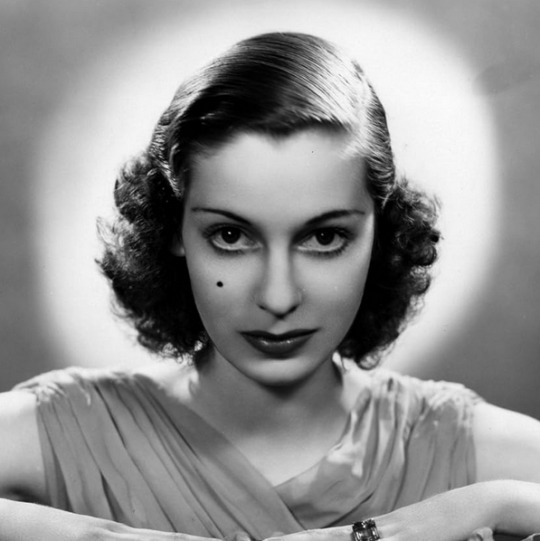
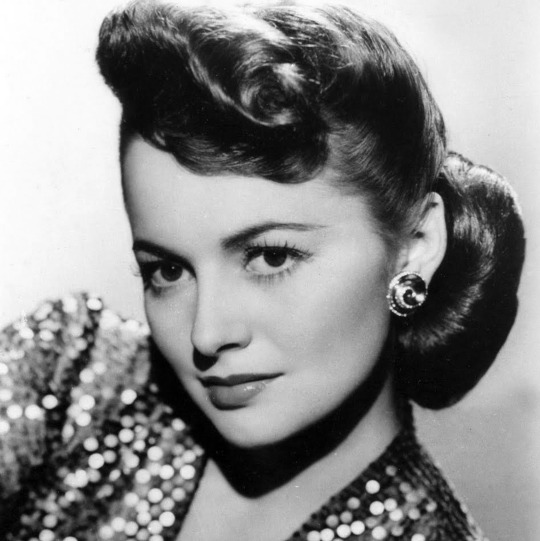
Propaganda
Valerie Hobson (Great Expectations, Kind Hearts and Coronets, Bride of Frankenstein)— Played the older Estella (younger was Jean Simmons) with such ice cold heartbreak, no one has ever bettered it. In later years she married John Profumo (yes, that one) and stuck by him, which IMHO was probably the greatest acting she ever did.
Olivia de Havilland (Adventures of Robin Hood, Gone With the Wind, The Heiress)— The woman who took on the Studio System at the height of their power and Won! A double Oscar winner! Is magnetic and beautiful in everything she's in and gave us all the juicy scandal with her sibling rivalry with Joan Fontaine! Before the Oscar Slap was the Oscar sister snub! Also everything she wears in Robin Hood she makes beautiful even a purple green and orange monstrosity how does she do it! Anyway this scene is one of my old Hollywood favourites
This is round 1 of the tournament. All other polls in this bracket can be found here. Please reblog with further support of your beloved hot sexy vintage woman.
[additional propaganda submitted under the cut.]
Valerie Hobson:

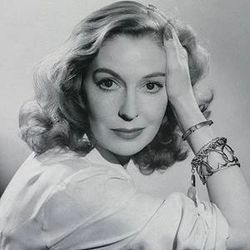
Olivia de Havilland:
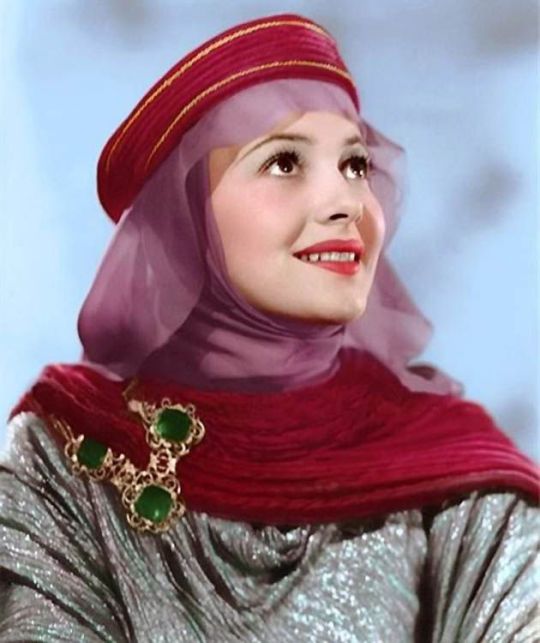
She is just perfection. She has a smile that is looks like it is barely holding back, and yet so reserved as well.


Broke the contract system and won freedoms for actors (the de Havilland Law is still in effect I believe). 2 time Oscar winner. Beautiful and smart
She legally challenged the movie studios' unfair contracts and won, setting a precedent for other actors to be treated more fairly. This was at great cost to her financially and essentially getting her blacklisted for years but the resulting judicial opinion is still known as the De Havilland Law and has won her a great deal of praise and admiration.

Her performance in The Heiress is one of my all-time favorites, she’s so good at making melodrama feel real and grounded without sacrificing any of the passion/drama.
Serenely beautiful, she struck a balance between crowd-pleasing fluff and prestigious drama. Famously at odds with her equally successful sister Joan Fontaine, she was too much of a lady to ever say anything public. Successfully sued Ryan Murphy for portraying her as a saucy gossip in Feud.
the period costume + eye patch combo in That Lady is just an absolute serve
She has the most adorable and cherubic face and voice

#my poor classic horror ladies#why are you always up against the wrong people#frankenstein#valerie hobson#olivia de havilland#elizabeth frankenstein#elizabeth lavenza#hotvintagepoll#poll#old hollywood actors#frankenstein in the movies#the bride of frankenstein 1935#the bride of frankenstein#gifs#1930s movies#1930s#1935#frankenthusiast#the blog of frankenstein
119 notes
·
View notes
Text

The Spy in Black Dir. Michael Powell 1939
I was going to combine this and Dark Journey in one post, but I ended up writing way more about The Spy in Black than I thought I would. I'm so, so glad I came back to this film. Rereading my initial thoughts after my first viewing, I realize clearly missed a lot because I was too hyperfocused on Connie being the way he is. But I did rewatch Dark Journey recently, and ended up liking that movie a whole lot less the second time around, so I'm not really in any hurry to post about it.
...
The Spy in Black feels worlds away from the grand, technicolor masterpieces of Powell and Pressburger. Despite the whole final act taking place at sea with the U-boats and battleships firing at one another, the film doesn't come close to the opulence of what are perhaps The Archers' most well-known and beloved films. The Spy in Black is minimalist by comparison, and yet it doesn’t feel out of place when considered among their other works.
Set mostly in the Orkney Islands, a damp and cold feeling permeates the film. That's something The Archers are exceptionally good at as filmmakers -- creating a multisensory experience for the viewer just through their visuals and sound design. Whether it's their wind battered Himalayan monastery in Black Narcissus, or the ever present rain and closeness of the sea to the little schoolhouse in The Spy in Black, Powell and Pressburger films are undeniably immersive. Atmosphere and a sense of place are key defining factors in their films even in this, their earliest work together.
The filmmakers also of course were aware of Conrad Veidt's prestige and wanted to make sure the look of the film paid homage to Connie's past work. There are scenes with deep, angular shadows for Hardt to disappear into and creep out of like in Caligari or Orlac. The title of the film has been bugging me, but now I think it's not so much about what Hardt wears as it is about him lurking in the shadows. (There's also a cute story about Michael Powell and Connie's first meeting where Powell was more than a little star struck; I believe he went on and on about Connie's deep blue eyes and his purring voice, which is understandable.)
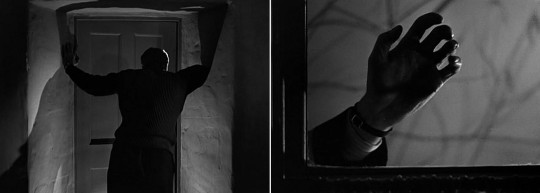
The writing suits their actors so perfectly. Compared to Dark Journey where everyone is so painfully British when they aren't supposed to be, there's something in the writing and direction that differentiates the nationalities in The Spy in Black. So even Marius Goring, who is British as can be, when playing a German naval officer isn't quite AS British as Sebastian Shaw and Valerie Hobson, if that makes any sense. It's a subtle difference, but there's something about the performances in this film compared to Dark Journey that allow for a greater suspension of disbelief.
And it's funny! Maybe not as obviously funny as Contraband, but The Spy in Black has some really finely crafted comedic moments that don't feel out of step with the rest of the film. It's not a comedy by any means; it's a drama with room for humor, kind of like real life… just with better looking people. When Hardt is wrestling his motorbike up a hill and is startled by a bunch of sheep, he baas back at them! It's a little moment that feels random at the same time it feels relatable. And it humanize Hardt, who doesn't really need the help -- he's already at this point in the movie completely endeared to the audience (or should be if you have a heart and eyes to see him). Most of the humor in the movie comes from Hardt being put in Situations.
The whole butter thing is so delightfully stupid. They establish Hardt early on as a foodie and a glutton, if only because he's been deprived of good food for great lengths of time. So when he arrives at the schoolhouse rendezvous and is checking each room to make sure it's safe, when the camera catches him in closeup staring with extreme intensity at something off screen. We're to think he suddenly sees something dangerous. The camera cuts to Miss Burnett/Fräulein Thiel/Mrs Blacklock looking confused and concerned. The music builds dramatically as they cut back to Hardt who is creeping towards the table. He reaches down, grabs something, the music crescendos, he lifts the thing to his face -- it's a giant block of butter.

It's delightful, it speaks to anyone who loves food, or at least just to me. Hardt then proceeds to eat most of the butter and, like, half a ham before collapsing but not without first lighting what are clearly supposed to be post-coitalesque cigarettes for himself and Thiel. Even though they spend most of the middle of the film flirting like goddamn pros, sharing a decadent meal is the closest they get to anything explicitly sexual.
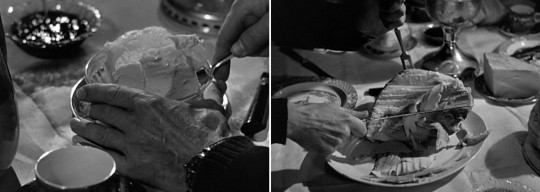
Production began towards the end of 1938 and the film was released in the spring of 1939. While England didn't officially enter the war until the following fall, one would have to imagine the threat of conflict was making the general population anxious. The Spy in Black is a WWI film, set in 1917, but unlike other cinematic narratives of the 1930s centered around past wars, this film doesn’t really go out of its way to glorify the military or present a particularly nationalistic story. All the characters are heroic, all the characters are flawed, none more so than the man at the center of the film, Captain Ernst Hardt, a German U-boat captain. The balls they had to make a film with this kind of protagonist at this time. Yet the film doesn't claim to make any kind of sweeping judgement, positive or negative, about Germans. It seems more likely that with the war looming, Hardt is less of a statement about Germans in general and more like Dark Journey's Von Marwitz: both characters seem to be informing the British audience that this outsider, Conrad Veidt, this man you mainly know as a screen villain, is a good man. He's one of us, it seems to suggest.
This film, perhaps uniquely for its time, focuses on the individuals rather than the nations they represent. It seems more focused on how each of the main characters are personally affected by their actions. While the acts of espionage are played out with slick intrigue, by the end of the movie Hardt and Mrs Blacklock are both full of regret. Everything they've done has done little more than lead to the deaths of people who had lives, families, people who loved them. No amount of honor and devotion to one's country in wartime can wash the blood from their hands. In Mrs Blacklock's case, I don't believe her heart was really in it. She breaks down on the captured ferry and says, "You’re in the hands of a man who cares nothing for his life or yours. And it's all my fault. I forgot we were at war, forgot that war means that it kills every fine, decent human feeling." And Hardt himself, for all his good intentions and humanity extended to his prisoners on the ferry, loses every one of his crew, men who may have been the only people he truly cared about in the entire world. And having lost them, having not been able to protect them from the fatal depth charge that struck their U-boat, he has nothing left to live for. The machine of war, or more accurately the psychology of war, claims Hardt as yet another victim. The real villain of The Spy in Black is not the German naval captain nor his men, but rather the war itself. The Spy in Black is at its heart, under all the sexually suggestive dialogue and clever cinematography, an anti-war movie masquerading as a standard espionage thriller.

Valerie Hobson apparently was hired to replace Vivien Leigh and, honestly, thank god. A hundred thousand Vivien Leigh fans would swarm my house with torches and pitchforks if they ever read this, but Valerie Hobson is a better actor and more charismatic, SORRY. She has more range and better comedic timing than Leigh (who went on to do Gone With The Wind anyway, so good for her I guess). Val is maybe more fun in Contraband, but I love that she and Connie got on so well, on screen and off, with each other and with Powell and Pressburger that they all got back together to make a second film. Watching The Spy in Black again, Contraband definitely feels like the more self-indulgent film, but I don't care. And here we get to see the beginning of that collaboration, see the sparks fly as Val and Connie expertly handle the dialogue and direction. I love their dynamic on screen; Hardt deferring to this woman that he thinks is his superior, the way she corrects his English (which was something Val did to Connie in real life that adorably carried over into the film), the way she barks at him to pick up his motorbike and go to bed, the way she looks at him at the end of the film with heartbreak in her eyes but can't bring herself to apologize or say anything at all. UGH. UUUUUGGHHHH. She and Connie have so many great moments together in this film, it's impossible to pick a favorite.
(Powell and Pressburger dared to put Connie and Val nose to nose and have him say to her, "It is evening and I am grown up, " knowing full well what this would do to unsuspecting audiences, only to -- just one year later -- go "hold my beer" and make give him even worse lines in Contraband. GOATed.)

Connie genuinely seems like he's having 10x more fun on this film than Dark Journey. For one thing, he's welcomed back to England after a couple flops and a stopover in France with a more interesting, more fully realized character, one where he's allowed to bring in more of his own opinions and creative choices. Captain Hardt feels more like a real guy, he's less perfect than Von Marwitz. On this rewatch, I realized I'd forgotten how gruff and grumpy Hardt is (which, like Andersen in Contraband, I chalk up to him being hangry). As captain, he's no-bullshit but endures lighthearted teasing from his shipmates. He's allowed to have a friend! Schuster and Hardt clearly have history, they aren't new to one another, they speak (comedically) in unison, after all. I mean, Hardt brings Schuster a block of butter later in the film! That's real friendship.
Hardt makes it known that he loves food, even simple things like bread and butter. This may have more to do with the military rations being beyond bad than a pre-existing character trait of Hardt's, but it gives him color and humanity. And Hardt is just as smooth as the Von Marwitz; when the fiancé of the real Miss Burnett shows up and sees the medal ribbon on his uniform, Hardt slyly and proudly states that it's the "Iron Cross, second class." And when Miss Burnett's fiancé assumes Hardt must be a prisoner of war, the Captain replies, slowly drawling his pistol, "No… you are." And all with the most perfect, calm confidence. He's a Bad MF, no lie.

So many interesting little things get revealed about Hardt pretty early on in the film. There are multiple exchanges about cigarettes being unavailable and someone offering him a pipe to which he says, "I never smoke a pipe." (As far as I see it, and I'm not complaining, but one of the only character differences between Hardt and Captain Andersen in Contraband is that Andersen does smoke a pipe lol) There are a handful of possibly queer coded things they throw in too: Schuster finds it humorous that Hardt would be reciting poetry in the dark to the lady spy he's to meet, to which Hardt says, "You think it's so funny, you know what you can do with it!" And earlier, when someone is looking for the captain, they're told, perhaps with an implied wink, that he might be found at the Turkish baths. Then there's the whole thing with Hardt literally pulling the cigar away from Schuster's mouth. I'm not saying definitively that Hardt is bi… but isn't he, though??
He is ultimately a reluctant spy; when he receives his orders to meet the German agent in Scotland, he's more annoyed than excited. He grumpily accepts his orders, but as a decorated military officer, doing spy stuff is beneath him. He insists on wearing his uniform even at the schoolhouse when he's supposed to be in hiding, because if he should die in service of his duties, he'd rather meet his end as Captain Hardt, not as an assumed identity.
Hardt is so wrapped up in his identity as a military officer that it ends up killing him. His end is tragic, nearly Shakespearean. He is not without honor, in fact he's positively full of it. He seems born and bred to follow orders, to whatever end they may have. And yet he is not a bad man. He commands authority but does not wield it with cruelty. He tells his crew to shoot any of the prisoners on the captured ferry who make noise, "with one exception" for a crying infant, and he allows the prisoners to escape on the lifeboats when the ship is sinking. Hardt cannot stop his own men from firing on the ferry, what they think is an enemy ship -- they have no way of knowing Hardt's taken over command of the ferry. Even his desperate and helpless cries and signals can't carry over the water to reach them in time. As the ship slowly sinks and everyone, including the ferry's original captain and crew, disembarks, Hardt elects to stay behind -- as his U-boat's commanding officer and with his entire crew lost and his captured ship sunk, Hardt makes the decision, in his mind the only decision, to die a captain's death at sea. The last time we see Hardt in closeup, he has tears in his eyes. We don’t see him drown, but we watch as an abandoned lifejacket floats across the frame. It's heartbreakingly tragic; we've gotten to know him, maybe even love him, over the course of the film.

I know I'm going on and on about this one, and I'm almost done, but I have a few more things to say.
People loved to get on Connie's case for his English pronunciation and his supposedly heavy German accent, but he sounds amazing in this film. He plays up some German pronunciation of certain words for comedic effect (Exhibit A: "Bütter"), but his natural accent is so inoffensive here (not that it's ever that bad, even in Rome Express or FP1 imo), and it sounds like he even tried to play it down even more than usual. And if I've said it once I've said it a hundred times, he's such a fucking master of vocal delivery. Hardt's voice sits almost in the same pocket that Von Marwitz's does but Hardt is allowed to be more expressive in his range. I feel like I have a whole separate post in me strictly about Connie's use of his voice. He's a master technician vocally, and yet for as studied as his film speaking voice in English may have been, it never sounds to my ears anything other than effortless and natural.
To wrap things up: Powell, Pressburger, Connie and Val Hobson really are the dream team. The Spy in Black is yet another movie I immediately wanted to watch again the second it was over. It's a 10.
#my writing#conrad veidt#the spy in black#hardt + bütter is my profile pic so i had to write about this movie at some point
27 notes
·
View notes
Text
youtube
Conrad Veidt and Valerie Hobson in the 1940 film Contraband. In addition to being a superb actor, Veidt was a very courageous man. He stood up to the Nazis in his home country, and contributed greatly to the British war effort. Hobson said this of Veidt: "We mustn’t forget that Conrad Veidt was a German, and at that time, with the war just starting, it was difficult for him. I think he always felt faintly embarrassed by the fact that he’d been a German star and had a very ripe German accent. Very cleverly Emeric made him not a German in Contraband. He was just as believable being a Dane, and that was charming." (Emeric Pressburger: The Life and Death of a Screenwriter by Kevin MacDonald)
#Conrad Veidt#Valerie Hobson#Contraband#Blackout#1940s movies#1940s film#British movies#British film#WW2 movies#WW2#Youtube
10 notes
·
View notes
Text
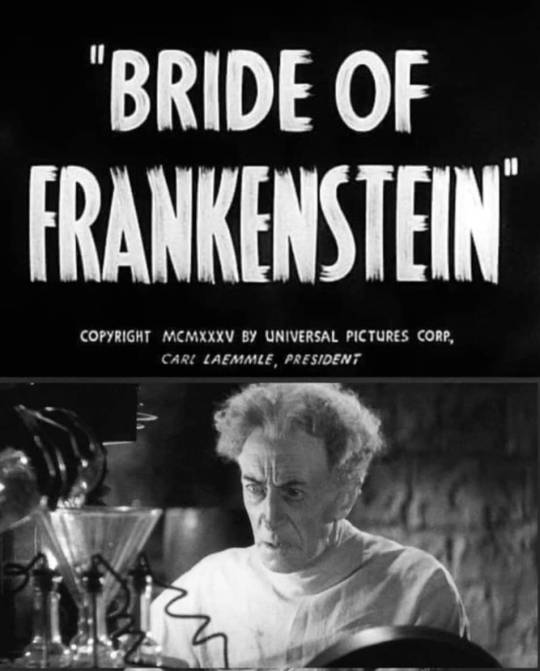
Ernest Thesiger
(15 January 1879 – 14 January 1961) as Dr. Septimus Pretorious.
Thesiger was a British stage and film actor. His early ambition was to be a painter, but after serving and being wounded in World War I, increasingly traveled in literary and theatrical circles. George Bernard Shaw wrote the role of The Dauphine for him in the play “Saint Joan”.
Thesiger made his film debut in 1916, and appeared in several silent films. He befriended director James Whale, who was hired to direct the screen adaptation of J. B. Priestley's novel Benighted as “The Old Dark House” (1932), starring Charles Laughton in his first American film, together with top-billed Boris Karloff, Melvyn Douglas, Gloria Stuart, Raymond Massey and Lillian Bond. Whale immediately cast Thesiger in the film as Horace Femm, launching his Hollywood career. The following year Thesiger appeared (as a Scottish butler) with Karloff in a British film, “The Ghoul”.
When Whale agreed to direct Bride of Frankenstein in 1935, he insisted on casting Thesiger as Dr. Septimus Pretorius, instead of the studio's choice of Claude Rains.
Thesiger made several appearances on Broadway, notably as Jacques to Katharine Hepburn's Rosalind in the longest-running production of “As You Like It” ever produced on Broadway. Later films included “The Horse's Mouth” (1958) with Alec Guinness, “Sons and Lovers” (1960), and “The Roman Spring of Mrs. Stone”, with Vivien Leigh and Warren Beatty (1961). That same year he made his final stage appearance—a mere week before his death—in “The Last Joke” with John Gielgud and Ralph Richardson.
In 1960, Thesiger was appointed a Commander of the Order of the British Empire (CBE). His last film appearance was a small role in “The Roman Spring of Mrs. Stone” (1961). Shortly after completing it, Thesiger died in his sleep from natural causes on the eve of his 82nd birthday. He is buried in Brompton Cemetery in London.
BRIDE OF FRANKENSTEIN opened wider in the United States on 20 April 1935, after premiering 19 April, 1935 in San Francisco and in Seattle.
Universal Pictures. Starring Boris Karloff, Colin Clive, Valerie Hobson, Elsa Lanchester, Ernest Thesiger, E. E. Clive, O.P. Heggie, and Una O’Connor.
Directed by James Whale. Screen story by William Hurlbut and John L. Balderson. Screenplay by William Hurlbut. Inspired by the novel “Frankenstein” by Mary Shelly.
Music by Franz Waxman.
Black and White. 75 minutes.
3 notes
·
View notes
Text
Film review
The film Great Expectations (1946) directed by David Lean is based on the self-titled 1861 novel by Charles Dickens.

Both the film (which is 2 hours and 58 minutes long) and the book is set in Victorian England and follow the story of an orphan boy Phillip Pirrip, nicknamed Pip, who lives with his brutal older sister and her soft-hearted husband Joe Gargery - a blacksmith. After the acquaintance with Miss Havisham and her adopted daughter Estella, who immensely alter the way Pip looks at his social status and position in life, which influences his character development, Pip receives an opportunity to become a gentleman on account of his anonymous benefactor Abel Magwitch. His life in London differs completely from his childhood. However, when the benefactor shows up, who turns out to be the convict Pip helped a long time ago, lots of problems occur. Pip is forced to save him from the police and decides to travel abroad with him. Yet they get caught and Magwitch dies in prison. After that Pip returns to his hometown where he reunites with Joe and meets Estella for the last time.
The film follows the novel's plot perfectly, precisely quoting Charles Dickens, for example, Estella's line "He is a common labouring-boy!" (25:09) or Pip's replica “I have been informed by a person named Abel Magwitch, that he is the benefactor so long unknown to me” (1:19:28). Nevertheless, the film has also many dissimilarities from the novel. For instance, at the end of the film Pip meets Estella in Miss Havisham's house (1:54:08), while in the book, it happens outside in the gardens. Moreover, Pip knows nothing about Estella's destiny in the film and begs her to leave the house where she wants to stay (1:55:31). In Charles Dicken's novel Pip and Estella have a pleasant conversation and decide to remain friends which is clear from Pip's answer to Estella's plea “We are friends” (Part II, page 145). The reason for changing these scenes is confusing to me since the rest of the film is similar to the novel.
Most of the characters in the film are portrayed as in the book. Adult Pip is played by Sir John Mills who was a British actor that appeared in more than 120 films. Although I imagined this character a bit differently and the actor looks older than the character in the novel, John Mills did a great job, I believe.
Adult Estella is played by Valerie Hobson, who I suppose was a great choice because of her majestic beauty and cold-heartedness. However, Jean Simmons as young Estella is a bit too old in comparison with Pip, in my opinion.

(25:42)
Mr Jaggers is played by Francis Loftus Sullivan whose presence in the film, to my mind, is really spot on as he is the spitting image of the character he portrays, described as "a burly man of an exceedingly dark complexion, with an exceedingly large head, and a corresponding large hand" (Part I, page 55).

(55:45)
David Lean uses various directing techniques such as the "black screen" to denote the time transition (33:42) that represents the past three months. Besides, the non-diegetic sound and gradual shot clarification in that particular scene create a mourning and depressing atmosphere suitable for the reveal of Pip's sister's death.
The costumes used in the film help to experience the 1940s and the Victorian Age due to the flawlessly selected raiment by costume designer Sophie Devine. According to the article, The Best Costumes of 1946 (http://thefilmexperience.net/blog/2021/6/24/the-best-costumes-of-1946.html June 24, 2021, by Cláudio Alves, The Best Costumes of 1946) which demonstrates the fashion of that time, it is comprehensive that characters' garment was chosen thoroughly.

(55:41)
I believe that it is inappropriate to compare books with films since it is impossible to recreate the influence the original work has on the audience. Although both works slightly differ, my perception of the novel did not change because of the individual approach of the director. I would not consider watching the film instead of reading the book a crime, but if a person wants to perceive the original picture of Great Expectations by Charles Dickens, it is, of course, more sensible to read the book.
0 notes
Photo

The Spy in Black (1939)
#1930s#actor valerie hobson#dir michael powell#dir the archers#dp bernard browne#cat thriller#cat war#british#monochrome#ear#braid#cigarette#soft focus#the spy in black
1 note
·
View note
Photo
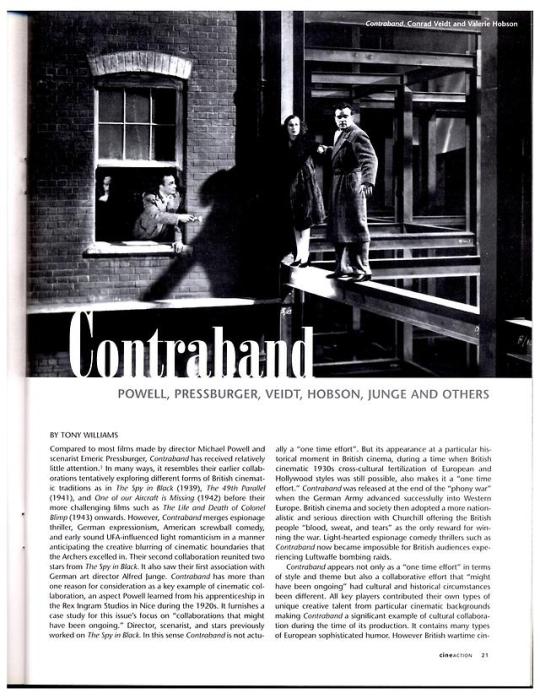
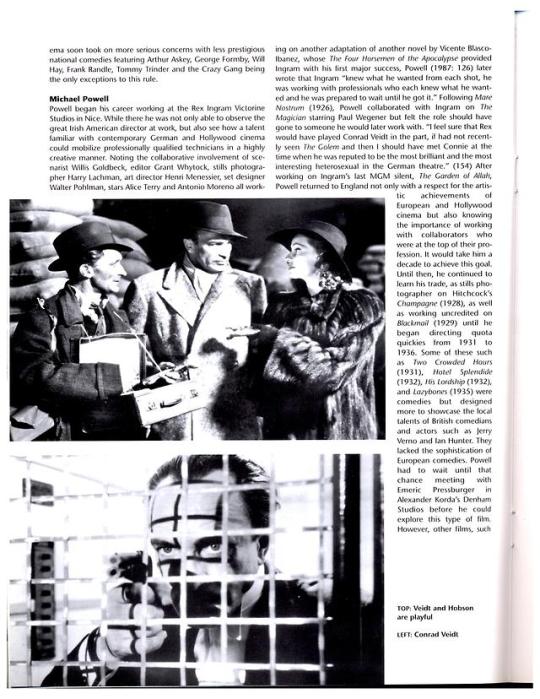
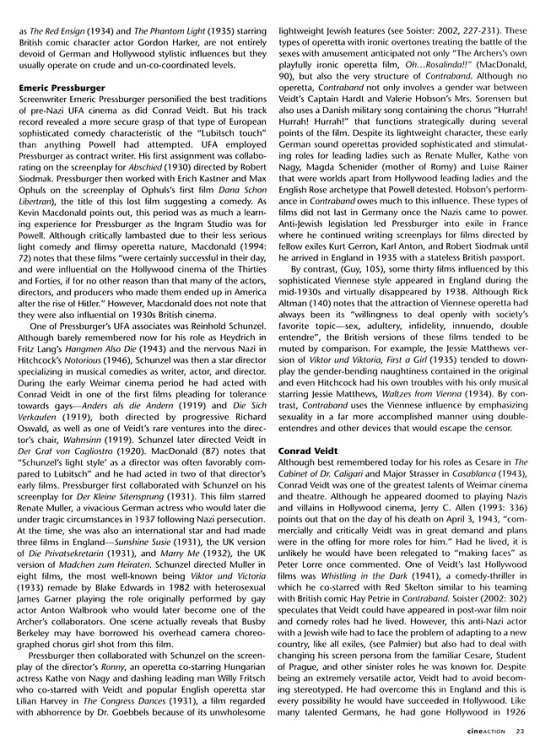
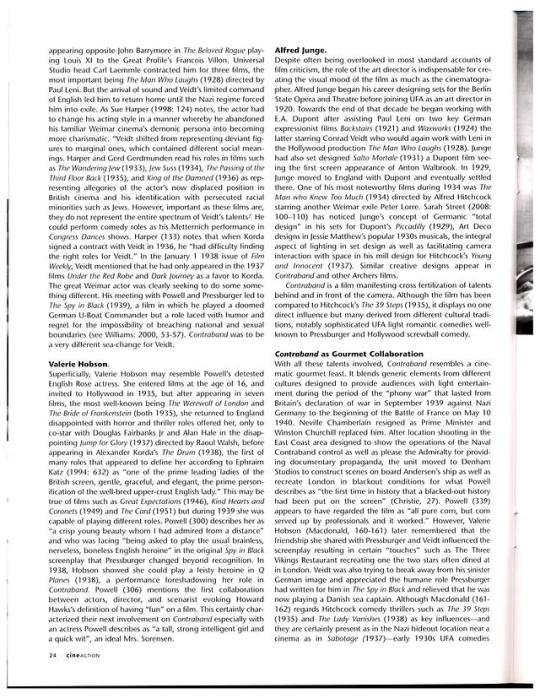
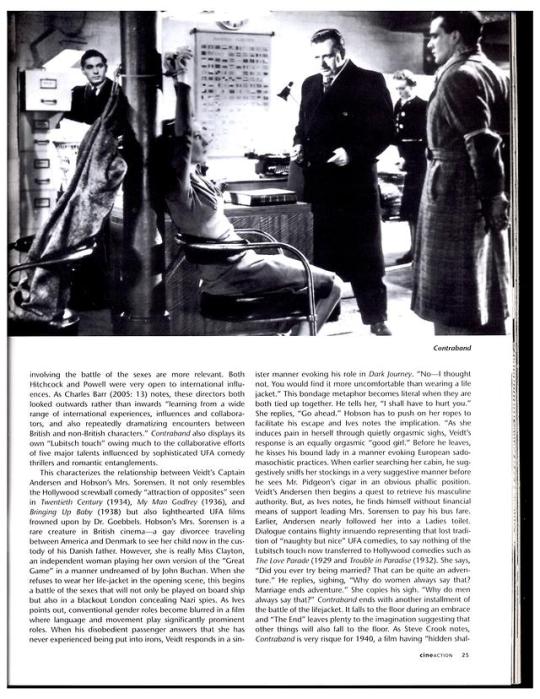
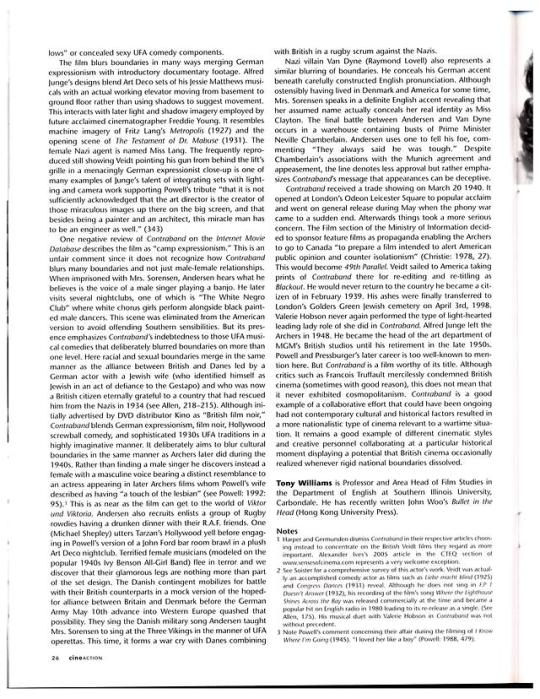
A really good article on Contraband by Tony Williams, from CineAction, issue 79 (available on the Internet Archive here).
#powell and pressburger#contraband#conrad veidt#michael powell#emeric pressburger#valerie hobson#alfred junge#laughing at the implication that singing was one of connie's talents though#bwhAAAHAHAHAHAHa#and every time they trot out that powell 'heterosexual' quote#after i've laughed so hard i've pissed myself i always wonder who those other actors were then#i mean my immediate thought was that he was referring to anton walbrook obvs#because 'awesome german actor from this period who also happened to be gay'#just immediately makes me think of anton#so many others were bi (was that a requirement?!?)#but anyway contraband is great fun and underrated and it is lovely and you should all watch it#i always wonder wtf that senses of cinema article meant by 'european' s/m practices#what's european about the top kissing the bottom#please explain#it's one of my kinks but i still don't know what's so european about it#as opposed to just... caring? romantic? the top showing they're not an arsehole?
6 notes
·
View notes
Text
Universal Horror Reviews Part 5: The Werewolf movies
(This isn't an actual series, but they are all Universal horror films and are on this dvd box-set I own of "The Wolf Man: The Legacy Collection", so I decided to group them together)
Werewolf of London

This 1935 film is often seen as an attempt to imitate Paramount’s success with the classic film version of Dr Jekyll and Mr Hyde in 1931. And certainly Henry Hull’s character Wilfred Glendon has similarities with Jekyll/Hyde of the 1931 film that goes beyond those that the werewolf idea inherently has with Stevenson’s story. The character is a London-based scientist here. And while his werewolf form isn’t talkative, he is more human-acting and wears clothes, which gives him more of a Hyde feel. The transformation scene ending with him putting on his hat and coat and walking out seems taken right out of the 1931 Jekyll film. The film suggests that in werewolf form Glendon’s dark side is expressed, which gives the werewolf myth even more Jekyll/hyde overtones. There is a flower that can momentarily cure his lycanthropy, and Glendon’s desperate struggle to get it mirrors that of Hyde’s struggle for the transformation drug. The film also ends with him being shot by the police at his home and him transforming back into his human self as he dies.
The film’s heavy debt to the 1931 Jekyll and Hyde film is obvious and undeniable. And Werewolf of London while a fine film is also definitely inferior to Rouben Mamoulian’s Jekyll. It does not have the strong, stylish and innovative direction and editing that makes the 1931 film such a classic. And being made after the Hays Code in 1935, the disturbing sex and violence that makes the 1931 film so shocking even today is also absent.
Still this is a very well-made film. And it is still one of the first Hollywood werewolf films and as such has some ideas of its own. Glendon’s fate is not of his own making, and Henry Hull makes him into a sympathetic figure. He is a man turned into a killer against his will and tortured by his guilt. Yet he is not wholly sympathetic. He is also quite a waspish and jealous person. These negative characteristics are heavily implied to play a role in his actions as a werewolf. His wife Lisa Glendon (played by Valerie Hobson) meets an old childhood friend Paul Ames (Lester Matthews) and their friendship rekindles, which awakens a strong jealousy in Wilfred. And this jealousy seems to also exist in his werewolf form and seems to motivate him in the finale. It is another trace of the influence of the 1931 Jekyll/Hyde film, but it is still a very interesting character dynamic for a werewolf. Henry Hull shines in this complex role.
Apparently the design Pierce ended up using six years later for The Wolf-Man was his original idea for the werewolf in this film. But Henry Hull didn’t want too disfiguring make-up, so a more restrained version was used instead. It is still good, and the transformation sequences are well done.
Warner Oland plays Dr. Yogami. He is the werewolf who bit and infected Glendon with “werewolfery” (as Yogami calls it), yet also struggles with the guilt over his involuntary killing. Dr Yogami probably is the element of this film that has dated the most. Oland was a white Swedish actor and was perhaps Hollywood’s foremost yellowface actor in the 30s, with his greatest success in the role of Charlie Chan. His character here at least speaks good english and is portrayed sympathetically, but yellowface it is. Yet his performance is if you can look past that rather good. He plays a man who is in the same situation as Glendon. Yet the two werewolves come into a tragic conflict over the cure.
Universal’s later film The Wolf-man would ultimately become the defining werewolf film. And I overall prefer the latter film. It develops the werewolf idea further and in a more original fashion, free from the strong Jekyll and Hyde influences that hangs over this film. Yet several of its ideas came from this movie made six years earlier. And this is a well-made and very enjoyable film, brought convincingly to life by the acting, directing and special effects.
The Wolf Man

This film excels in gothic foggy environments
This film is perhaps the definitive werewolf film. In fact, it might be the most influential werewolf story. What Bram Stoker’s original Dracula novel was to vampires, this film might be for werewolves.
And that might be because it is such a compelling tragedy. Lawrence Talbot is the most sympathetic “universal monster” of them all. He is just an ordinary person, who gets bitten by a werewolf and turns into one himself. And what this leads to is an innocent man, who loses control of himself and is compelled to kill. It is an impossible situation, the guilt is terrible.
Certainly that was also in Werewolf of London, but Talbot is far more pitiable. There was the suggestion in the 1935 film that Wilfred Glendon’s werewolf form was an expression of his dark side (with shades ofJekyll and Hyde), his jealousy and aggression being unleashed in his murders. That isn’t the case with Larry Talbot, he attacks people that he loves and has no real reason to hurt.
It makes him into a more simple character perhaps, but it makes the film more focused and able to tug harder on the audience’s heart strings. The emotions are more direct, more strong. The audience might be unsure what to think of Wilfred Glendon, but Talbot feels more unambiguously deserving of our sympathy.
This is Lon Chaney Jr’s most famous role and it is perfect for him. Chaney Jr. was an underrated actor and this film is proof of that. By the end of the film, his entire bearing is expressing the guilt, anguish and fear Talbot is feeling.
The supporting cast is excellent too. Claude Rains is of course excellent as Lawrance’s father Sir John Talbot. His position is almost as difficult as that of his son. The very end of the film when he realizes the full tragedy of his and his son’s situation is heartbreaking.
Bela Lugosi is in this film too, relegated to an important but small role as the werewolf who infects Talbot. Putting an actor of such weight in a relatively small role might seem like a waste, but he adds to the film a lot. His character has not aged well, he is a romani stereotype but it is a sympathetic one and his screen presence makes the character work. Maria Ouspenskaya plays his mother, and despite the romani stereotyping she has to portray is actually quite touching as a maternal figure. And Universal stalwart Evelyn Ankers does good work as the love interest here.
The film is just beautifully mad. The great script by Curt Siodmak is an elegiac dark fairy tale. The dialogue has a mythical quality to it, and indeed it is sometimes mistaken for genuine folklore, like the famous “even a man who is pure in heart…” poem
Together with the atmospheric cinematography, set design, the wolf man’s make-up by Jack Pierce and the music all contributing to the gothic mood. It is perhaps the last great Universal horror film and remains an emotionally affecting tragedy.
She-Wolf of London

This is a movie that is almost impossible to talk about without spoiling it, it ends with a big twist that is very fun if you don’t see it coming.
I recommend seeing it before you read the rest of this review. It’s a good movie as long as you leave any preconceptions of what it should be at the door.
Reading about it, I’ve noticed this movie isn’t that well-liked among Universal horror film fans. It’s because it is really a mystery and not a proper supernatural horror movie. The idea of a female werewolf is suggested, but never actually shows up. And instead it ultimately becomes a mystery film. But it is a good one in my opinion. The suggestion of werewolves adds a nice gothic tinge to the mystery drama. The characters are interesting, there is some good fucked-up psychology driving the plot here. That the story is centered around and driven by three women feels refreshing even today, and definitely makes it feel different from other mystery films of the era.
8 notes
·
View notes
Text
Duke's Monsterween: Frankenstein
Hello I'm Andrew Leduc And Welcome Back To Duke's Monsterween...
Where That Thunder Has Something To Do With What We're Reviewing Today, I Am In Fact Talking About The Fact That I Am Reviewing Frankenstein On Today's Show...
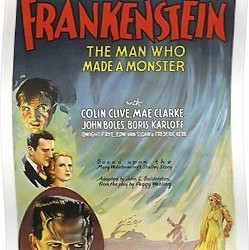
Directed By James Whale, This Movie Tells The Story Of Henry Frankenstein (Played By Colin Clive) A Young Scientist Who Creates A Hideous Sapient Creature Out Of Old Dead Bodies In A Science Experiment But When Said Creature Escapes, Will Henry Destroy It Before It Kills Anyone?
No, But Let's Find Out As We Watch Frankenstein...
The Film Starts With An Introduction By Edward Van Sloan Who Plays Henry's College Professor, Dr. Waldman In The Film That The Film May Be A Little Scary For Some Viewers...
youtube
(Start 0:06)
After The Credits Roll We Meet Henry Frankenstein And His Assistant, Fritz (Not Igor) (Played By Dwight Frye) Who Are Waiting For A Funeral To End So, They Can Steal The Body For Henry's Secret Experiment...
Looking For A Brain Now, He Tries A Dead Body That's Hanging From The Gallows But Henry..If You Come Close, I'll Tell You A Secret, Come Here, Come Here, A Little Closer...
He's Dead!!!!!!
Of Course, That Brain Would Never Work! A Genius Could Tell You That That Brain Would Never Work And That You Would Have To Go Elsewhere!, So Why Bother Even Showing Us This Scene When It's...

Needing A New Brain, Fritz Goes To Goldstadf Medical College Where Henry's College Professor, Dr. Waldman Is Ending A Lecture On The Difference Between The Human Brain And The Criminal Brain...
After The Class Is Over, Fritz Sneaks In And Grabs The Regular Brain Only To End Up Letting It Fall Out Of His Hands, Leading Fritz To Take The Criminal Brain...
Meanwhile, Henry's Fiancé, Elizabeth (Played By Mae Clarke) Meets With Henry's Best Friend, Victor Moritz (Played By John Boles) To Tell Him That She's Worried About Victor Despite Getting A Letter From Him...
You Know, Elizabeth...Henry's A Grown Man, He Can Take Care Of Himself...
Yes, He Has Some Secrets Involving His Experiments But I Think These Secrets Will Only Strengthen Your Relationship With Him..,
Promising To Talk To Dr. Waldman About Henry And His Experiments To See What He Knows, Victor Takes Off, Only For Elizabeth To Decide To Come With...
OK, She's Becoming Very Clingy...
They Talk With Dr. Waldman And Ask Him Why Henry Left The University Which Leads Waldman To Tell Them That Despite His Theories On Electrobiology And Chemical Galvanisim Were Far In Advance Of The Universities Theories, His Demands When It Came To Bodies Were Unreasonable..
Victor Laughs At The Notion Of The University Unable To Give Him Animal Bodies For His Experiment, But, Waldman Sets The Record Straight That It's HUMAN Life, Henry Is Interested In. Asking Waldman To Come With Them To Bring Henry Home, He Refuses At First, But Decides To Help For Elizabeth's Sake...
Later That Night At Henry's Lab In Goldstadt, Fritz And Henry Prepare Everything So Henry Can Bring The Body To Life, But When Elizabeth, Waldman, And Victor Show Up, Henry Lets Them In Briefly To Give Them Shelter From The Rain...
Henry Tells Elizabeth He's Fine And Let Him Have At Least Tonight But She Acts Clingy Again And Won't Let Him...

With Victor Calling Him Crazy, Henry Decides To Let Them Up To Show Them What He's Up To...
youtube
(End At 5:03)
The Next Day, Victor And Elizabeth Tell Henry's Father, Baron Frankenstein That Victor Is Fine But...The Father Believes That Victor Is Having An Affair With Another Woman...
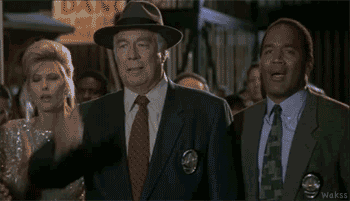
What Is Wrong With This Family?!? The Fiancé Is Clingy As Hell And The Dad Believes His Son Is Having An Affair, Can't Henry Just Work On His Experiments Without His Family Being So Nosy?!
But Aside From That, I Will Admit The Dad Is One Of The Funniest Characters In This Movie..
Meanwhile At Henry's Lab, Henry And Dr. Waldman Talk While They Wait For The Monster To Arrive As Waldman Believes The Monster Is Dangerous Because They Stole An Abnormal Brain, But Despite Knowing That Fact Victor Isn't As Concerned Right Now....
This Eventually Leads To The First Reveal Of The Monster (Played By Boris Karloff)...
youtube
(End At 2:41)
youtube
(End At 0:35)
With Fritz Becoming The Monster's Personal Tormentor, The Monster Kills Fritz And Breaks Out Of His Chains, But Luckily, Frankenstein And Waldman Shut The Door Before He Can Escape...
Getting A Sedative, They Release The Monster Who Attacks Frankenstein So Waldman Can Give Him The Sedative...
Victor Arrives To Tell Him That Elizabeth And His Father Are Coming, So The 3 Of Them Hide The Monster Just As Elizabeth And The Baron Arrive...
Finding Henry A Complete Mess, They Decide To Take Him Home With Waldman Promising To Destroy The Monster And To Save The Notes Of His Work, But While Attempting To Destroy The Monster, He Wakes Up, Kills Waldman And Escapes Into The Countryside...
A Few Days Later, It's The Day Of Henry's Wedding And Elizabeth Is A Wreck As She Has A Sort Of Psychic Feeling That Something's Going To Go Wrong With The Wedding Or Henry...
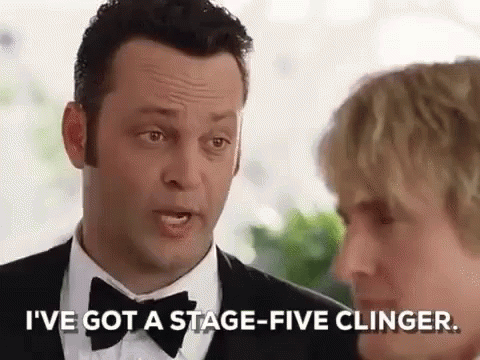
But Just As Henry Is Talking With Elizabeth He's Pulled Out By Victor, Who Tells Him That Dr. Waldman Is Dead And The Monster Is Loose On The Countryside Or Should I Say Loose In The Mansion?...
Victor And Henry Search All Over The Mansion For The Monster With No Sign But When They Hear Elizabeth Screaming They Go To Check On Her Only To Find Her Lying Down On The Bed In Shock...
When The Town Hears About The Monster Drowning A Little Girl, They Form Search Parties To Find The Monster...
But Let's Be Honest They're Really Angry Mobs...
Eventually Though The Monster Runs Into His Creator..
youtube
With The Monster Going Into The Windmill, It Leads To The Final Showdown Between Frankenstein And His Creator...
youtube
(Start At 1:28, End At 3:59)
Now, We All Know What Comes Next, We've All Seen Bride Of Frankenstein And Know That The Film Continues From The Windmill...
But Whale Thought This Was Going To Be The Only Frankenstein Film In History So He Made An Ending To This Film Which I Now Call The Alternate Ending Where Henry Survived The Fall From The Mill With Elizabeth Nursing Him Back To Health...
With The Both Of Them Living Crazily Ever After...
This Film Is Okay...
I Enjoy Both Boris Karloff And Colin Clive's Performances As Dr. Frankenstein And The Monster And The Set Pieces And Designs Were Pretty Awesome For The Time, Some Of The Other Actors In The Film Were Pretty Good Too...
But The Only One I Have A Problem With Is Mae Clarke As Elizabeth Who Was Nothing But A Clingy Nutcase Who Couldn't Live Without Henry For 10 Seconds...
I'm Glad They Recasted Her With Valerie Hobson For The Sequel As She Was Still Clingy But Acted More Like What A Fiancé Or Wife Should Act Like...
This One I Definitely Say To See...
Till Next Time, This Is Duke, Signing Off...
#Frankenstien#Colin Clive#boris karloff#Mae Clarke#Edward Van Sloan#Dwight Frye#James Whale#Universal Monsters#halloween#horror review#SoundCloud
1 note
·
View note
Photo

365 Day Movie Challenge (2018) - #216: The Spy in Black (aka U-Boat 29) (1939) - dir. Michael Powell
An early pairing of director Michael Powell with screenwriter (and eventual filmmaking partner) Emeric Pressburger, The Spy in Black is a somewhat confusing yet generally watchable thriller set in the Orkney Isles during World War I. It’s not clear to me why Powell would have been interested in making a film that lends any sympathy to the German military, particularly since the film was made on the eve of Great Britain’s entry into World War II, but perhaps Powell’s affinity for his leading man, Conrad Veidt, is the most obvious explanation. Veidt was in a new and exciting era of his career, enjoying renewed stardom in American and British productions, soon to include Contraband, The Thief of Bagdad, A Woman’s Face and Casablanca. But although Veidt is as charming as ever in the role of Captain Hardt, the head of a U-boat mission to sneak him into Scotland and infiltrate the rest of the UK, it takes the film quite a while to establish why we should care about the plot at all. To Powell’s credit, his work with the actors is as all fans of his projects can expect - he makes fine use of Valerie Hobson, who portrays the character through whose eyes we see the majority of the narrative unfold - and the black-and-white cinematography by Bernard Browne (who died during the war) captures the Scottish skies rather impressively. Still, I probably wouldn’t rush to recommend The Spy in Black to any viewers who aren’t already fans of this particular genre, Powell, Veidt and/or Hobson.
#365 day movie challenge 2018#the spy in black#u-boat 29#u boat 29#1939#1930s#30s#michael powell#emeric pressburger#powell and pressburger#powell & pressburger#conrad veidt#valerie hobson#world war i#wwi#spy film#spy films#spy movies#british cinema
2 notes
·
View notes
Text

Technicolor Familiar Watches Too Many Conrad Veidt Movies Part 5 of ?
Part 1 // Part 2 // Part 3 // Part 4
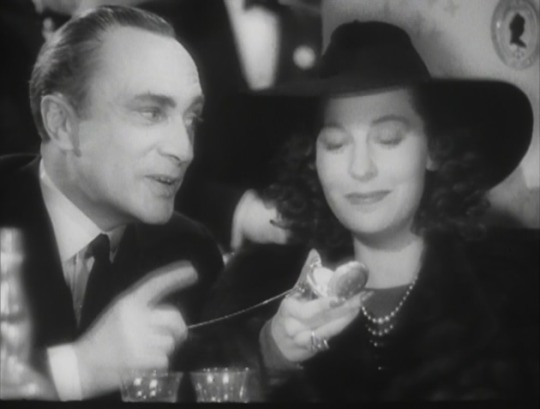
Contraband (Blackout), 1940 Dir. Michael Powell ⭐4/5 Watched Dec 18, Archive.org Uncle Erik: Your Captain, he is a beautiful man! From the first moment, I loved him! Me: Hard same. So much fun. By far my favorite of the Connie Spy Thrillers I've seen so far. Valerie Hobson is so slick, and the rest of the ensemble is pretty good for a change, especially the guys at the Danish restaurant. The bondage scene (not really, but... yeah, it is) lives up to the hype. The screenwriters really went off on this one, didn't they? I mean, this movie gave us Conrad Very-Serious-Actor Veidt whispering lovely things in the dark like "good girl" and "do you trust me?" The scene with the music box in the pocket watch? Too much, can't handle it. Connie's dry humor is a delight and all the sexy, flirtatious fun he's having in this role is like a precious balm for my tortured soul.
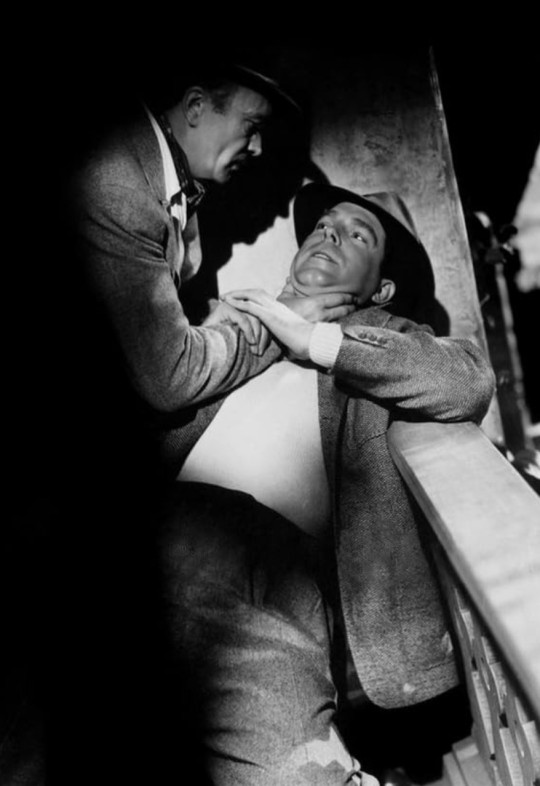
Above Suspicion, 1943 Dir. Richard Thorpe ⭐3/5 Watched Jan 3, Vudu Oh, filmmakers. Bless you for having Fred MacMurray get strangled in greeting by Conrad Veidt. A great film it is not, but it's definitely cute. And while it's a semi-tough watch as Connie's last film, I'm so glad it was this one where he's clearly having a ball -- whether on the dance floor (does Hassert always go out in the middle of the day to tango with mature, voluptuous women?), getting stepped on by Joan Crawford, sticking his fingers in bowls of cake batter, or climbing down trellises with his knees all out in the wind. He's very obviously living his best life and I love that for him. The movie is riddled with very silly, eyeroll-worthy one-liners, but the plot is enjoyable. Joan Crawford looks like she's having a good time too, and Fred MacMurray is pretty tolerable. I haven't seen Basil Rathbone in a lot of other movies, but I wish he got to be nastier and that he and Connie got to have some scenes together. Connie's physicality is so subtly funny, I really wish he had gotten to do more intentionally comedic films/roles.
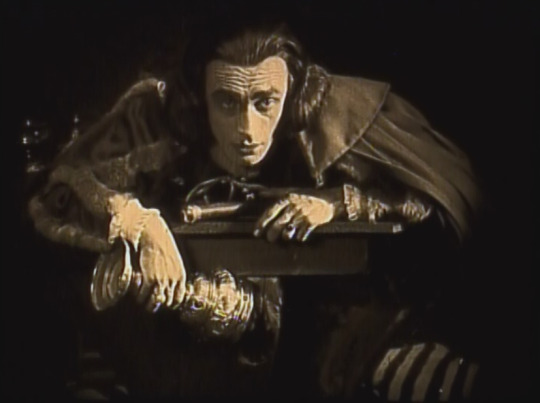
Lucrezia Borgia, 1922 Dir. Richard Oswald ⭐3/5 Watched Jan 10, Archive.org I've been trying to watch at least one silent every once in a while. And while I have to lodge my typical complaint of these older films being a bit too long, this film is clearly a feat of production for the year it was made. The huge, open sets and beautiful costume details were incredible. As always, Connie 100% steals the show. He's delightfully wicked and nasty, slimy and pathetic. I wish he had better scene partners to receive and react to his intense performance as Cesare Borgia. But it's ok, it's like a Game of Thrones episode without the dragons or misogynist nudity.
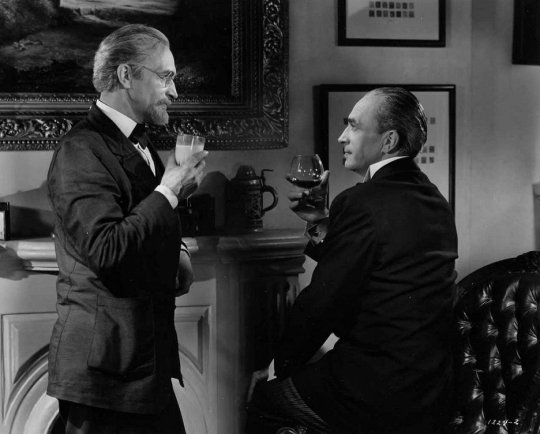
Nazi Agent, 1942 Dir. Jules Dassin ⭐4/5 Watched Jan 14, Youtube I admit I chose to watch this one because I was charmed by the idea of Double Connies. But not even five minutes in and Otto had won my heart. I didn’t know anything about the movie itself going in, but was completely prepared for it to be cringey and mediocre. So I was pleasantly surprised that it was actually decent. Maybe I'm rating this one higher than it really deserves, but really those four stars all belong to Connie's performance/s. Daggers in my heart. So many moments in this little movie affected me more than I expected: Otto's line to Richten about being only one of however many million citizens willing to rise up against fascism; his look toward the Statue of Liberty at the end; the little glittering tears in his eyes when Fritz says, "We do what we're told because we must…"; his gentleness and deeply tragic sense of loss that permeates the film. And, perhaps most of all, how cute he was with his pet canary. Cue the waterworks. I have so many more thoughts about this and about his time in Hollywood in the 40s in general, but I'll save that for another time.
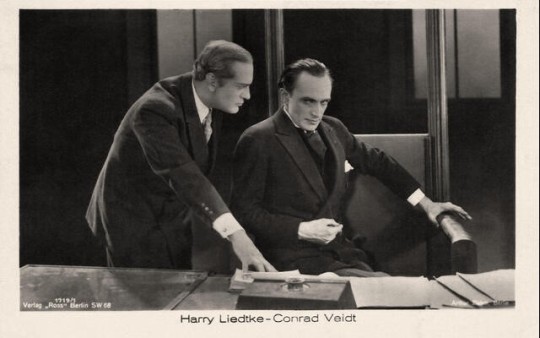
Kreuzzug des Weibes, 1926 Dir. Martin Berger ⭐3.5/5 Watched Jan 20, Snowgrouse's masterpost This movie was made nearly 100 years ago and we're still having the same conversations about reproductive rights today, especially now in the US after Roe v Wade was overturned in 2022. It's pretty disturbing how much of the script could be lifted from a dozen different arguments between contemporary conservative lawmakers and the people trying to better advocate for and provide safe reproductive healthcare. It's a pretty bare bones film, the story and performances clearly more important, appropriately so, than cinematic bells and whistles. Thought it was an interesting choice to have the lawyer's office so stately and huge, like the patriarchal systems he's operating in -- overbearing, empty and impersonal. The movie does feel like a public service announcement (which I guess it was), but that didn't really bother me. What bothered me was the ending, because OF COURSE the woman has to comfort the man even though she's the one who went through a major trauma. But the way Connie's character broke after the doctor told him what happened to his fiancée? I've never seen anything like that. He went fully offline. His whole nervous system got unplugged and rewired. P.S.: The extra half star in my rating is for all the monocle twirling.
#my writing#conrad veidt#contraband#above suspicion#lucrezia borgia#nazi agent 1942#kreuzzug des weibes#held off on posting this because so many of my posts are cv centric lately...#it's been a fallow period for art over here
12 notes
·
View notes
Text
Another movie project
Why Dame Judi Dench and Eddie Izzard are heading to Llandudno
The town is just one of a number of locations across North Wales that directors are choosing to film in
A movie starring Dame Judi Dench and comedian Eddie Izzard is set to start filming in Llandudno this month.
Andy Goddard, a director who worked on Downtown Abbey, will direct from a screenplay written by himself, Welsh actor Celyn Jones and Izzard.
It tells the story of a teacher at an elite finishing school on the English coast who gets caught up in a Nazi conspiracy.
Izzard, who appeared alongside Dench in the 2017 film Victoria & Abdul, plays Thomas Miller, a literature and language teacher born to English and German parents who teaches members of the German League for Girls.
As the Second World War looms, Miller is framed for murder and accused of being a German spy after he confronts the League’s charismatic leader, a staunch supporter of Adolf Hitler.
Dench portrays Miss Rocholl, the stern school headmistress who comes to Miller’s aid after he goes on the run and attempts to exonerate himself.
According to the movie news website Screen Daily, principal photography is scheduled to begin in June in Llandudno.
Celyn Jones’ partners at Llandudno-based Mad As Birds Films, Sean Marley, Andy Evans and Ade Shannon, are producing the film alongside Sarah Townsend of Izzard’s Ella Communications.
However, Llandudno is no stranger to film crews.
In 2002 the town provided the backdrop for the Forsyte Saga starring Damien Lewis and Ioan Gruffudd.
The town’s Grand Hotel and Happy Valley Road featured in the movie Yanks in 1979, directed by John Schlesinger and starring Richard Gere and Vanessa Redgrave.
Another production shot Llandudno was The Card - a black and white film version of the novel by Arnold Bennett.
Released in 1952 it starred Alec Guinness as Denry Machin, Petula Clark as Nellie Cotterill, Valerie Hobson as the Countess, and Glynis Johns as Ruth Earp.
Many local people in the town became extras in the film, including Daily Post columnist, Judith Phillips.
North Wales is attracting more and more film-makers. Last weekend Anglesey was used to shoot a new blockbuster starring Robert Downey Jr.
Crews closed off Menai Bridge as they filmed scenes for The Voyage of Dr Dolittle.
The Universal Pictures production is due for release in April 2019 and sees the Iron Man and Tropic Thunder actor taking the title role, with Antonio Banderas, Michael Sheen and Jim Broadbent also starring.
Cameras have also been spotted this week at Bodnant Garden, in the Conwy Valley, although it is not yet known what the film is called or what it’s about.
Mad As Birds Films was approached for a comment regarding the Dench and Izzard movie.
10 notes
·
View notes
Text
Super-long rant-review post about Werewolf of London (1935) with images and spoilers...
I love Werewolf of London, this 83-year-old film. It’s got some problems typical of 1930s Hollywood, but I still find a lot of value in it.

The setting, the moonlit hills of Tibet. Accuracy? not so much.
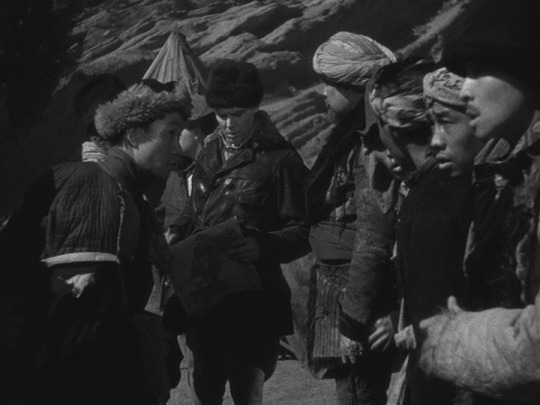
Apparently the “Tibetans” are actually speaking Cantonese...and the white actors are clearly not speaking anything. 30 years before Star Wars and it honestly sounds like they’re speaking Ewok...but it’s just gibberish. I think the only realistic part of this scene is the fact that there actually are bactrian camels in Tibet. At least it’s quite well filmed.
The sequence where Dr. Glendon (Henry Hull) is attacked by the werewolf is really eerie and holds up well.


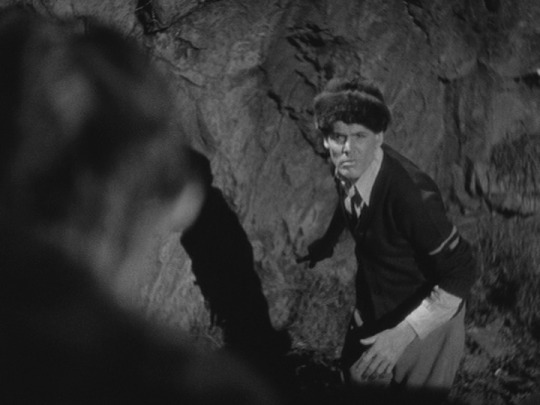
The actual bite is so quick but if you screencap that second it’s creepy AF.

Despite the attack, Dr. Glendon gets his coveted “Mariphasa Lupina Lumina” flower (sadly, completely fictitious) and heads back to England.
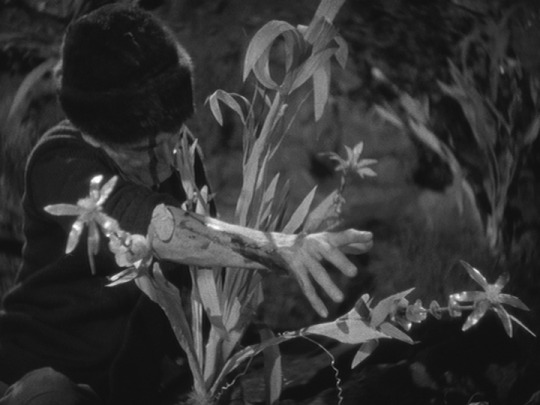
In his lab, Dr. Glendon lives out his mad-scientist aesthetic surrounded by some high tech equipment. He even gets buzzed by his wife on what is basically an old-timey FaceTime device that lacks audio. Even though we know it’s superimposed footage it’s fairly seamless.
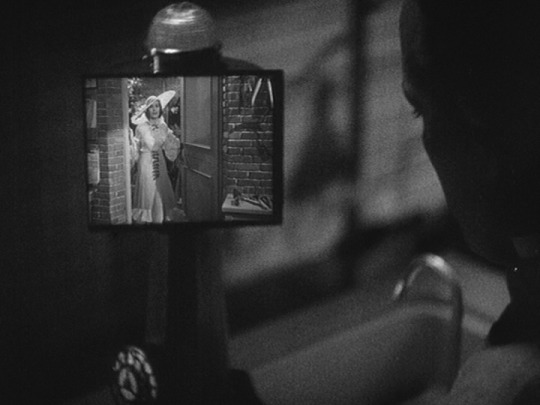
Next we get a little portrait of a marriage. He’s working on an experiment with flowering and artificial light and his wife Lisa (Valerie Hobson) wants to know what the hell he’s up to. He’s secretive and she’s understandably annoyed. But she calls him “dear old bear” which is quite sweet but ironically hints at the animalistic transformation to follow. He says that after the experiment he will try to be more “human” but we know that ain’t gonna happen.

Henry Hull’s accent. It needs its own paragraph. It’s not bad for someone from Louisville, Kentucky, and in fact sometimes it’s really amazing, but other moments it crosses your mind that the dialect coach was out sick that day of shooting. He enunciates very strongly. His jaws much have hurt him a bit. He’s fun to listen to though and you gotta give the guy credit because he doesn’t shy away from being über-Brit.
Enter Lisa’s old childhood sweetheart Paul, played by the adorkable yet suave Lester Matthews. He and Lisa, whom he refers to as “Lee”, reminisce about their joint childhood exploits.

Cue Dr. Glendon’s jealousy:

Understandably, Dr. Glendon is quietly dying inside because he hates all the socializing that comes with being a world-renowned botanist. Seeing another man making his wife smile does not help his mood.

Lookit ‘em; holding hands for heaven’s sake. Aunt Ettie also likes to stir up trouble and add to Glendon’s jealously which isn’t very nice of her.
Side note, Dr. Glendon has some tricked-out plants:
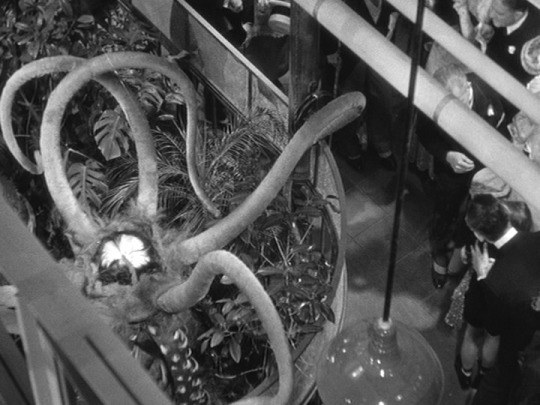
Now we meet Dr. Yogami (Warner Oland).
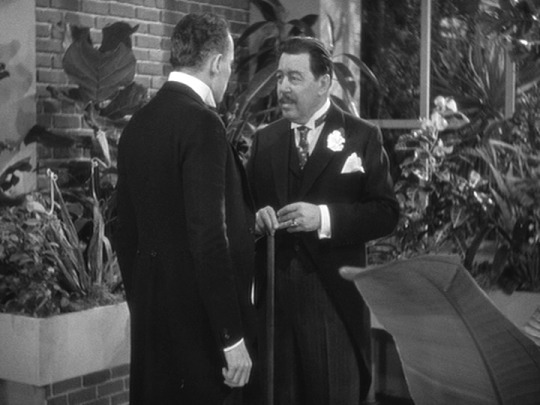
Warner Oland, who was often cast as Asian characters because he “looked Asian”, was actually Swedish. (One would think that 80 years later this casting of white actors in non-white roles would have come to an end but we’re still dealing with this crap.) While Oland is a fairly good actor, he’s still NOT Asian and it would have been so much better if they had cast Sessue Hayakawa as Yogami as he was not only gorgeous but a better actor.
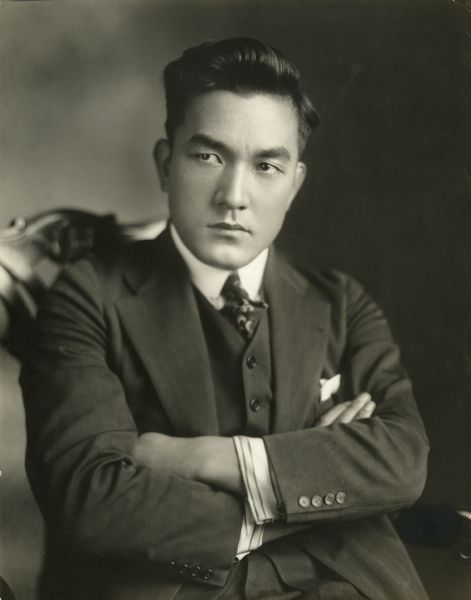
However, Yogami is implied to be Chinese or Tibetan and Hayakawa is Japanese. Still, if the character was stated as Japanese it would have been perfect. Ironically, later on in the film Aunt Ettie keeps calling him Yokohama which is the second largest city in Japan. And I can’t find the surname Yogami anywhere. I can find Yagami and that’s a Japanese surname, not Chinese or Tibetan as far as I can tell. Oh, Old Hollywood and your stomach-churning whitewashing.
Dr. Yogami says that they met before in Tibet...in the dark. He’s giving him a really big hint that he’s the one who bit him (...either that or he’s implying they met for an evening liaison). Dr. Glendon is trying to piece it together.
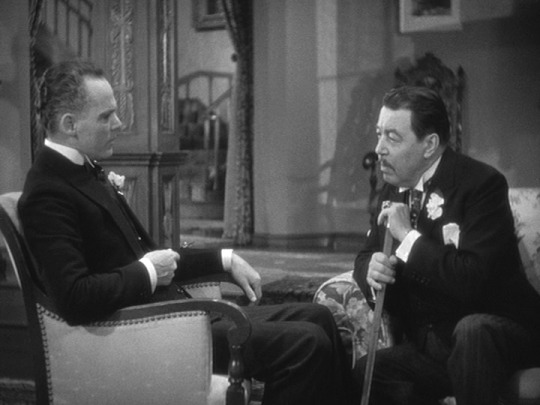
Dr. Yogami says, “The medical term is ‘lycanthrophobia’.” WRONG. The medical term is lycanthropy, if being a werewolf was actually real. (The uncommon thing were people grow all the excess facial hair is hypertrichosis.) Clinical lycanthropy is a rare psychological condition that is linked to schizophrenia, bipolar disorder and/or clinical depression. (More on that later.)
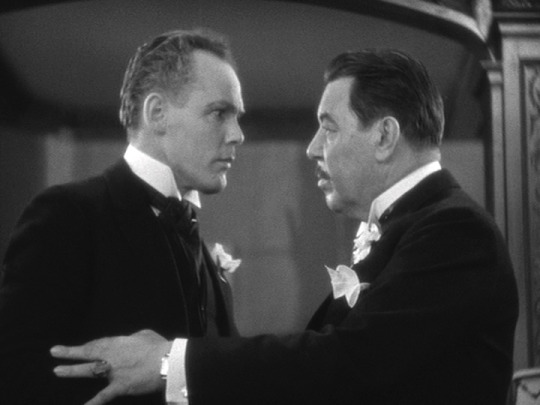
Here’s a cap of Dr. Yogami intimately stroking Dr. Glendon’s injured arm while making hella awkward eye contact. As modern viewers we may or may not have a strong impulse to read this as somewhat sexual, or maybe as an identification of repressed homosexual desire. Lycanthropy in literature and film mythology has occasionally been used or identified as a metaphor for homosexuality.
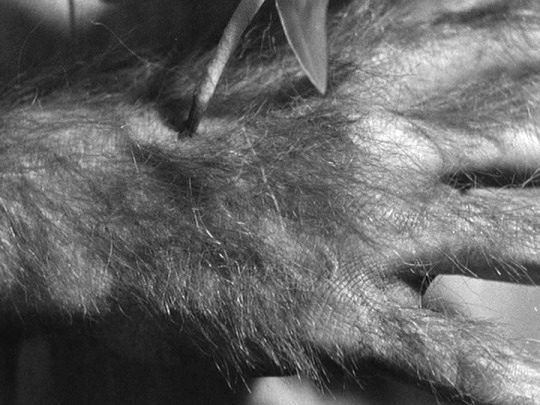
In a world where stabbing yourself with a plant gets rid of monthly hair growth. I’m curious to know why it looks like his stabbing it into a dorsal metacarpal vein and not the palmar (inside) side of wrist....medical side of Tumblr help me out here. Maybe they just wanted to feature the hairy hand.
Dr. Yogami essentially asks Dr. Glendon for a blossom of the glow-in-the-dark flower to save his soul (and his fellow botanist as well), albeit in a cryptic way. He says “But remember this Dr. Glendon, the werewolf instinctively seeks to kill the thing it loves best.” Sadly, Dr. Glendon thinks he’s full of crap and ignores his warnings despite knowing that stabbing himself with this rare flower magically makes his moon-grown hand-hair disappear. Dumb or in denial?

So of course Dr. Yogami steals not one, but two flowers. For two of the four nights of the full moon. Technically there is only one night of full moon at any given time but I’m going to give this a pass. Maybe during the time that the moon is still almost full, though waning, it still have the power to change man into the “satanic creature.”
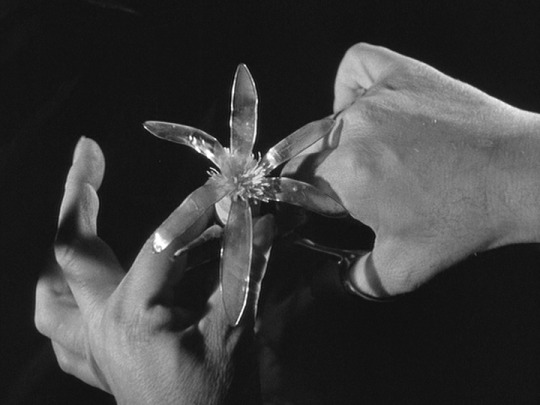
Meanwhile, skeptical Dr. Glendon does a little lycanthropic research:
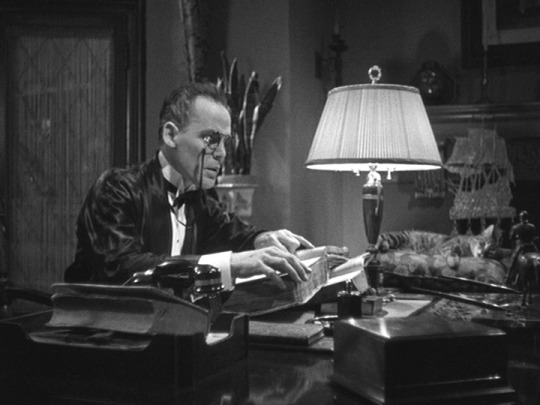

Lisa drops by and asks him to join her and Paul at a society party but he pegs out or course, and then adds a jibe about not wanting to hear anymore childhood memories. Is the werewolf infection making him bitchy or is he just like that? Hard to tell.
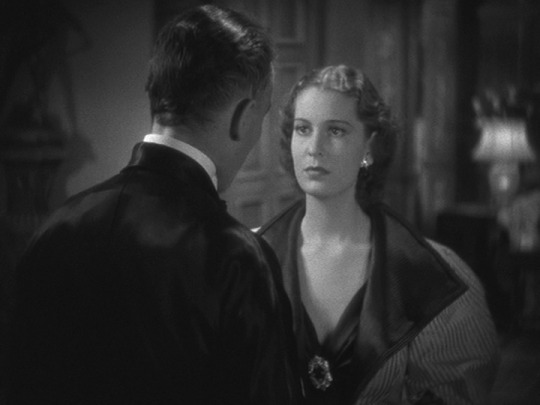
Lisa is hurt. But he says she should go out and enjoy herself. She tries to show him this brocade he bought her but he flips out when she turns on the lights. Presumably being a werewolf makes you sensitive to light.
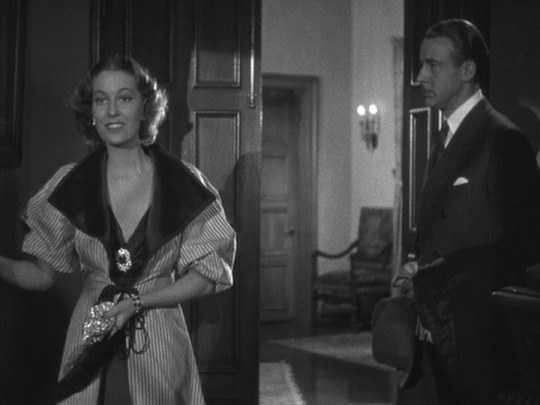
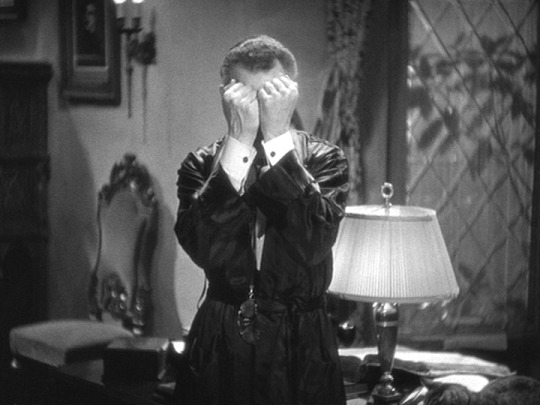
He responds with the “I put some medicine in my eyes” routine and they clearly don’t buy it.
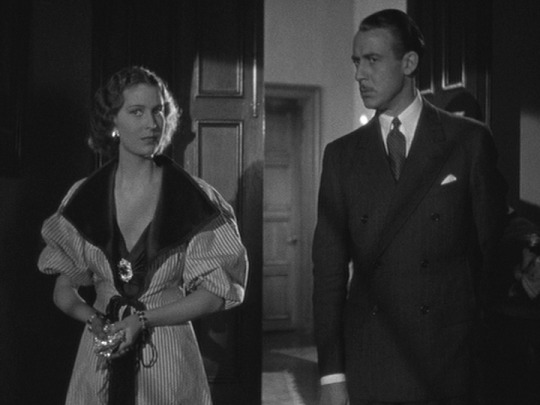
Seems fake, but ok.
I feel like this is one of many allusions to depression in this film: sensitive to light, wanting to be alone, disliking small-talk and society parties, general introversion and distrust of others. We get a sense that he’s kind of this way anyway at the core of his personality but the werewolf contamination has made that all worse.
Dr. Glendon may be a jerk but it’s hard not to feel sympathy for him. He really does love her. She’s still too annoyed to reciprocate.
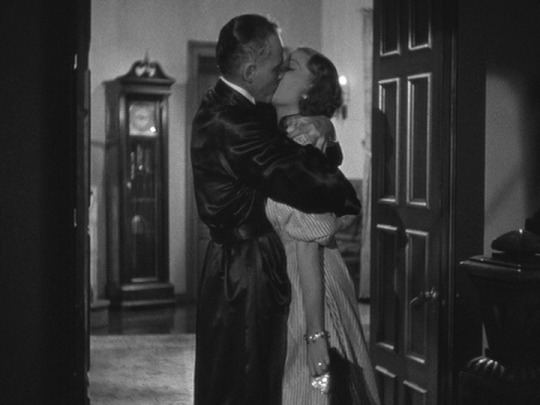
Even his cat’s pissed at him.

When animals start rejecting you, ya know you got problems.

And lo, he thought, “oh shit.”
The moonlight transformation sequence is quite simple by today’s standards of physical and special effects, but it’s still effective. Using the shadows to break up the footage isn’t fooling anyone, especially nowadays, yet it has a kind of fluidity that makes it oddly very evocative.
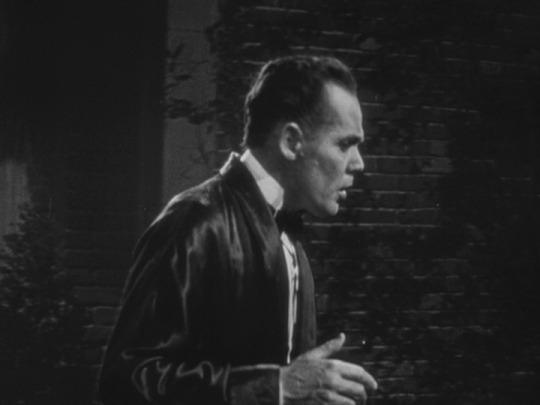
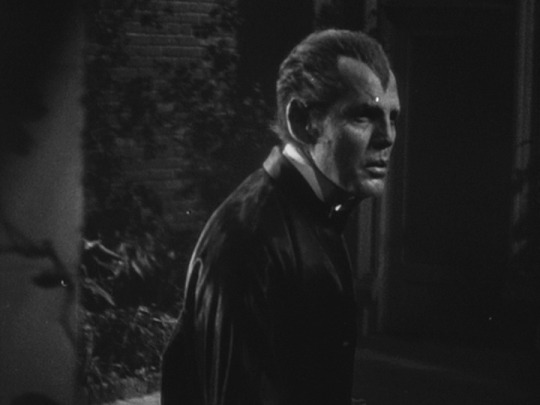
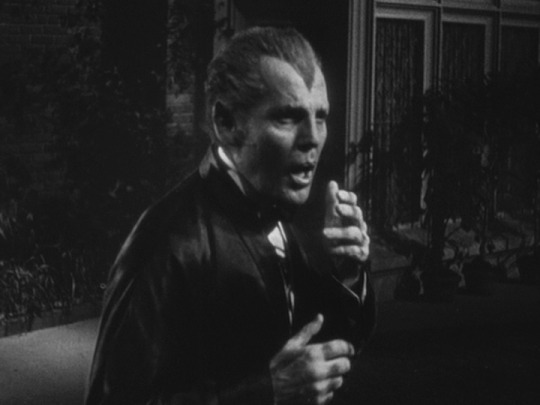
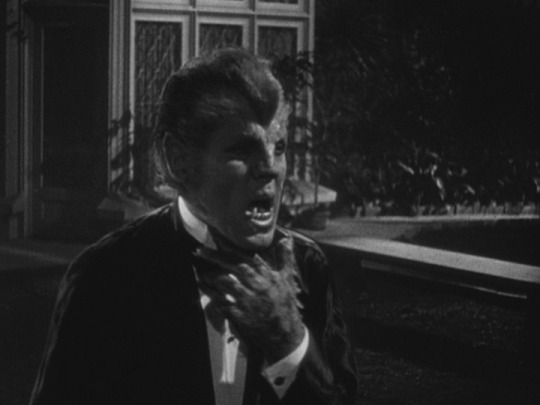
A word about Jack Pierce’s makeup. Believe it or not it was originally going to look like this:
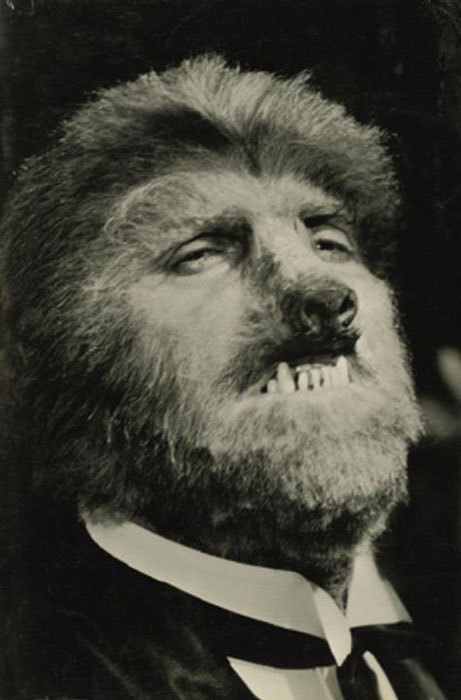
Oink oink. Thank heavens someone talked Jack into a more minimalist look. Jack Pierce, known for his incredible work on films like Frankenstein (1931), The Mummy (1932), and The Wolf Man (1941), to name but a few, appears to have been a tad stubborn depending on the actor he worked with. He had a great relationship with Boris Karloff as far as I’m aware but the harmony working with Hull didn’t last long. There was a rumor going around that Hull was super vain and didn’t want the makeup to obscure his face. The truth of it was there are a couple scenes when Lisa and Paul both recognize him and if the werewolf makeup was applied too heavily, this part of the plot just wouldn’t work. Apparently Hull went over Pierce’s stubborn head straight to Carl Laemmle to fix the problem. The book Universal Horrors: The Studio’s Classic Films, 1931–1946 by Tom Weaver and John Brunas has more on this. (And in the Svengoolie intro to the film featured on ME TV.) The incident paid off because the final makeup was stellar.
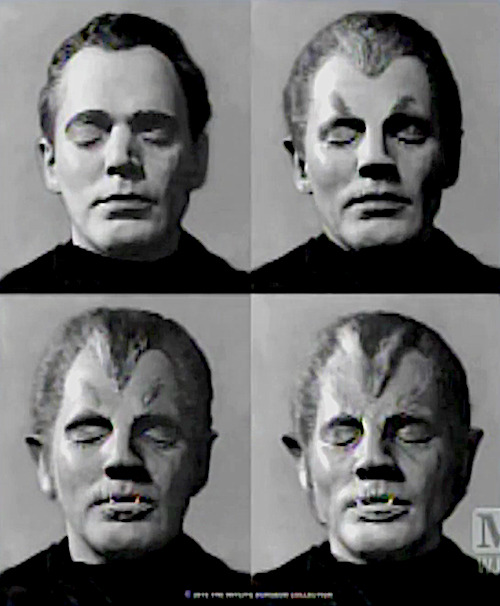
That awkward moment when someone steals your flowers:
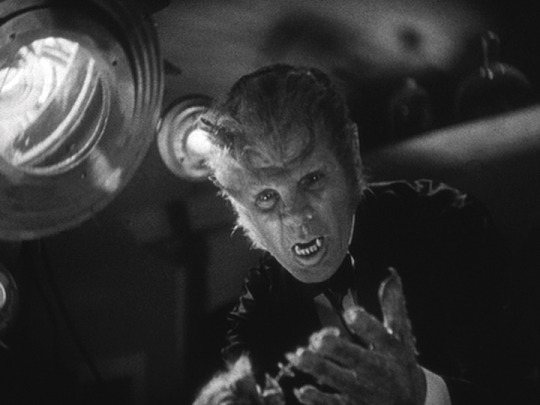
Suddenly filled with jealous rage...
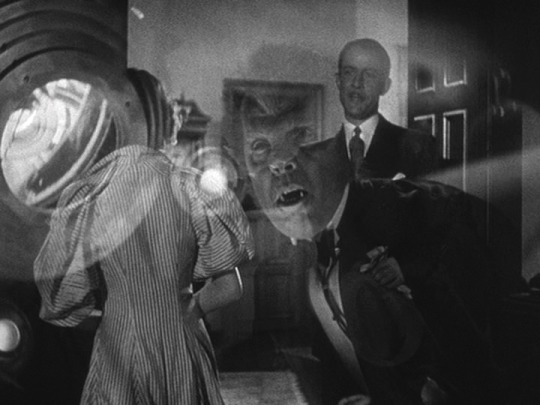
...but wait lemme just put my hat and coat on first. If he does that when he’s full-on werewolf can you imagine how much time it takes for him to get ready normally? Diva.

The obligatory party scene...
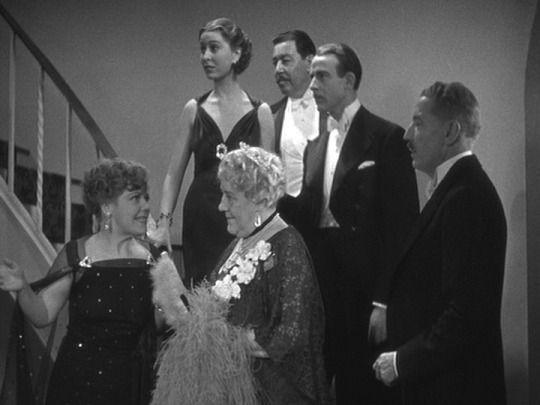
...with a comic interlude from Aunt Ettie who drunkenly says to “Dr. Yokohama” as she calls him, pointing to a dodgy district visible from her flat, that people there would “knife you for a shilling.” But then they hear the howl of a “lost soul” which is the chilling call of Dr. Glendon and it’s time to go inside.

Drunk lady trope scene. No point in rescuing her she already made a fool out of herself but off they run:
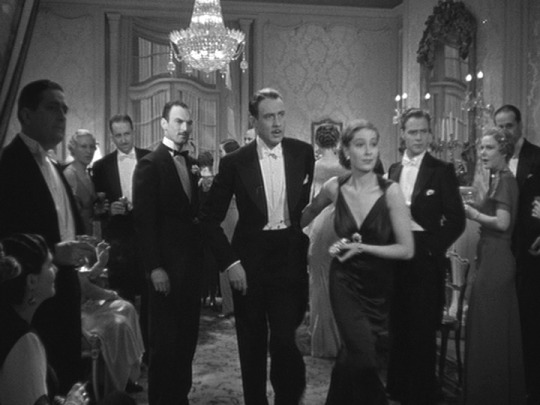
There is a ring of sadness to Aunt Ettie’s drunk scene because she says “she gets so nervous.” Hello social anxiety. She is a tad obnoxious as a character but this part makes her seem so much more sympathetic.
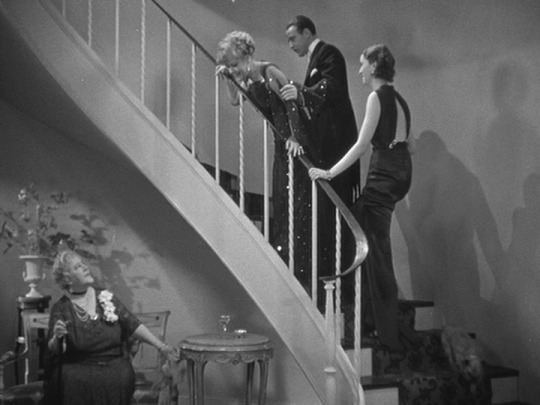
“A-woooooooooooo!”
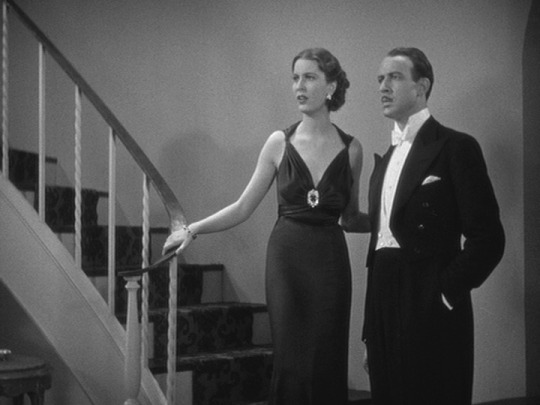
Ok, that’s not a dog.

Dr. Yogami is quaking in his spats at this point.
Even though you know that this is Dr. Glendon, this remains creepy. Who hasn’t thought of a monster clawing their way into your bedroom late at night? They really milk the suspense in this scene.
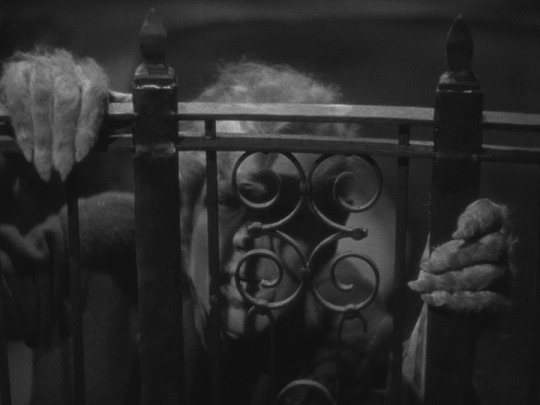
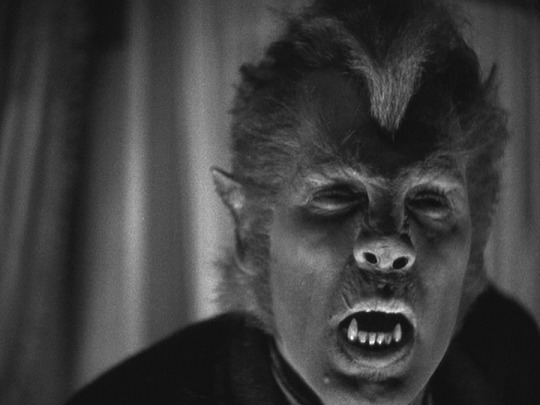
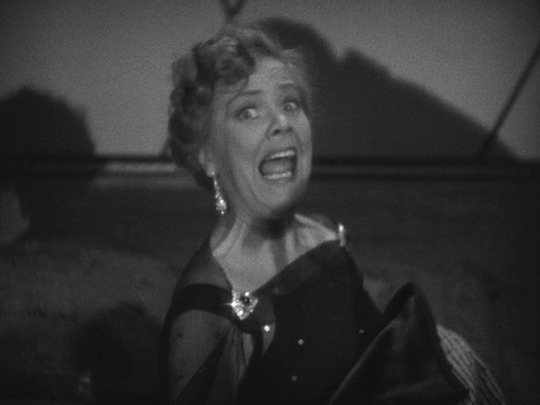
Lisa is offended by Dr. Yogami’s seemingly sexist and controlling behavior but in reality he’s trying to save her life. He knows that Dr. Glendon is on the loose and can probably smell her and will likely kill her. But she goes up to comfort her friend anyway.

Cue the “you just had a bad dream” scene. For once Ettie isn’t full of hogwash.
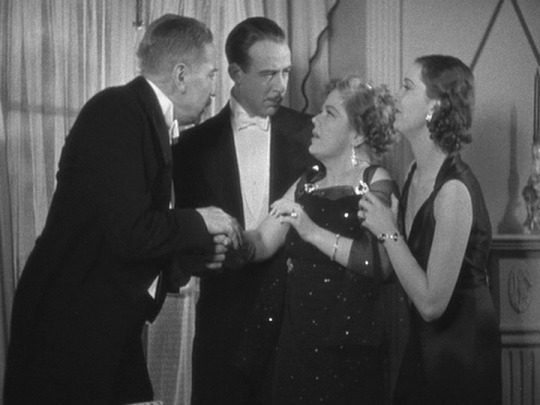
Poor Ettie. Seeing a werewolf will sober you up pretty quick.

Mr. Hyde? Oh wait, wrong movie.
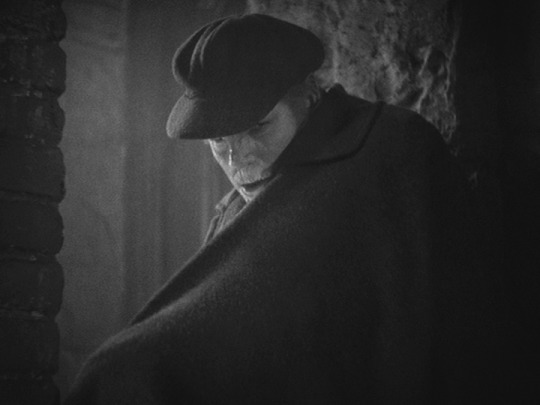
Apparently all young women of a lower class looked like Hollywood starlets back then. Pretty stylish.

This is why I don’t have a Tinder.
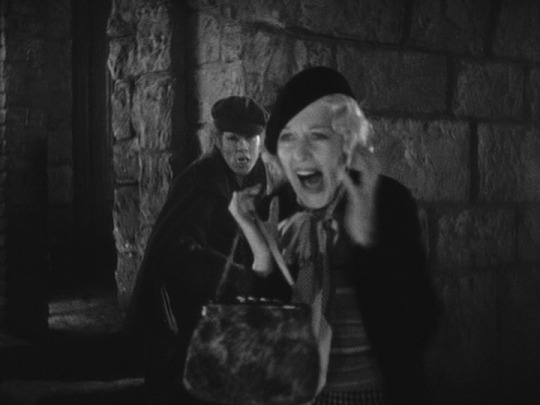
Dr. Yogami executes an A+ facepalm. His wrist-leaning skills are classic. 10/10:
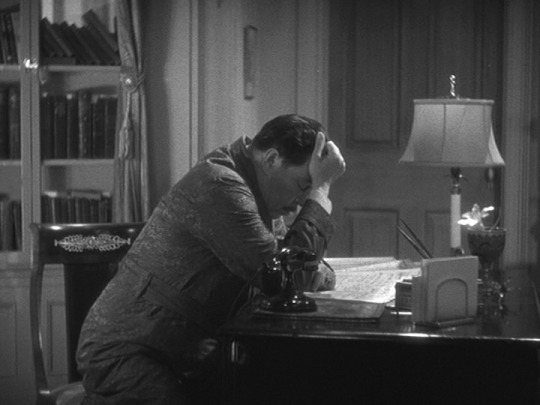
I mean, what did he think was going to happen? You can’t blackmail a guy who’s in denial about being a werewolf, it doesn’t work. But then, if he left one flower there you wouldn’t have a second act.
Paul says that it might be a werewolf attack. He’s almost joking but he makes the suggestion anyway. His uncle, head of Scotland Yard no less (now that’s convenient) thinks this is ridiculous.

Meanwhile Dr. Glendon reads about how he accidentally murdered a woman last night:

“You’re being utterly hateful, Wilfred.” She sees that he’s not happy and we all know that he’s past the point of no return. Someone has already died. His bitterness at her relationship with Paul is exacerbated by this revelation. But he doesn’t storm from the room or hurt her. He actually acts like an adult, says he’s sorry, and says that he will go out horseback riding with her after all. A lot of reviewers don’t like his character but I find him continually sympathetic.
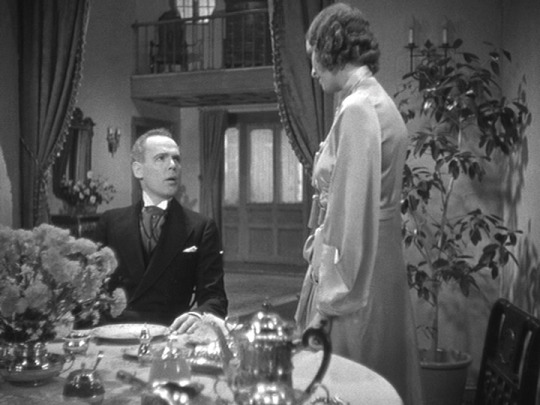
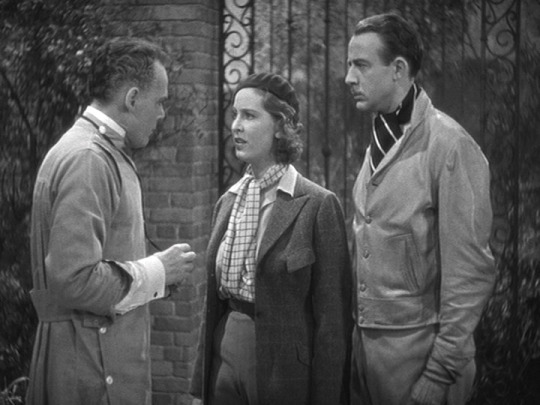
Again, it’s a realistic portrayal of a marriage. Dr. Glendon “forbids” his wife to go out on a midnight horseback ride with her ex. As sexist as his I’m-the-man-putting-my-foot-down-with-the-wife routine is, he has a couple genuine reasons for acting this way. He’s worried about her safety cause he knows the moon is gonna make him crazy and he could unintentionally kill her in a fit of jealous rage. And of course he’s ticked off that Lisa is galavanting around with another man. She in turn is appropriately angry with his controlling remarks without having good reason for his concern...plus she wants to prove a point that he’s not making enough time for her in their marriage.

Mrs. Moncaster explains how decking her “dearest friend” Mrs. Whack was an appropriate action to take in the sake of business.
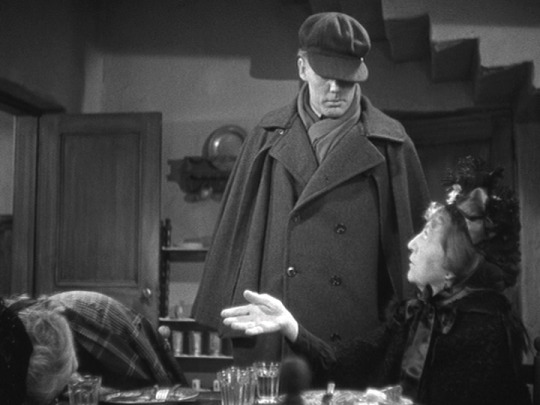

Dr. Glendon calls himself “Singularly single, madam. More single than I ever realised it was possible for a human being to be...” Which seems to evoke qualities of his situation and depression. He feels so isolated.

He prays that this transformation won’t happen again but it does.
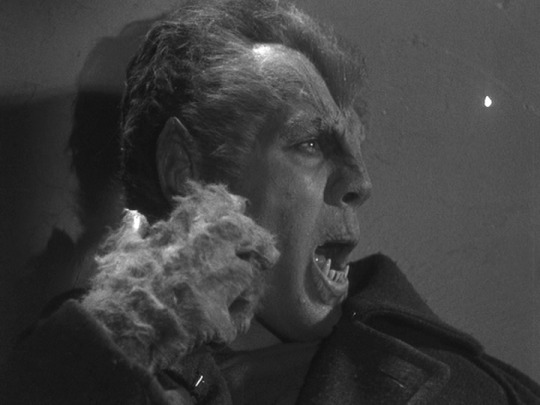
“If I ran the zoo I'd let all the animals go” - Dr. Seuss. This is Glendon’s way of causing a distraction so that he can attack another woman but it’s also symbolic of him releasing his inner animalistic nature.
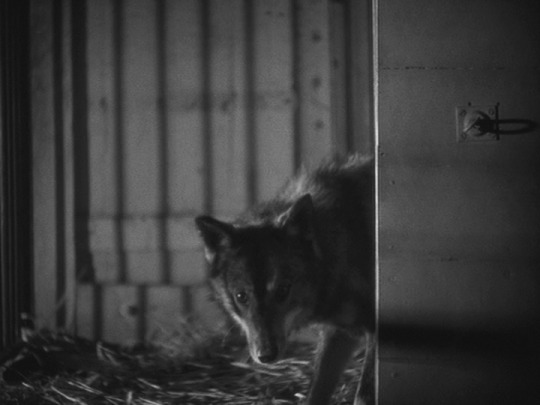
Ya gotta appreciate the special effects:
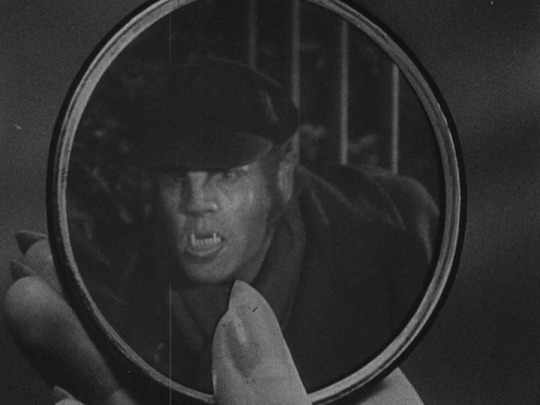
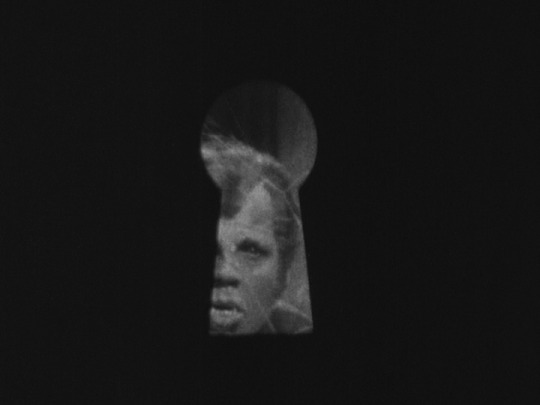
Dr. Yogmai hails from the University of Carpathia. Here to represent.....an institution that I’m fairly certain doesn’t exist. Unless they mean Vasyl Stefanyk Precarpathian National University but that wasn’t established until 1940. Still, he’s a professor of botany so that’s cool. Kind of like Professor Lupin.
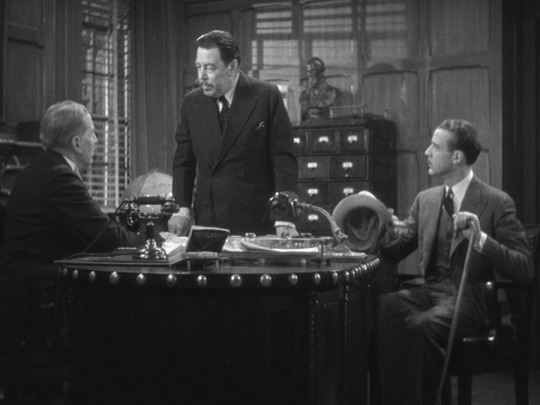
Presumably, Dr. Yogami goes to Paul because he’s well connected and he wants to prevent Dr. Glendon from doing anymore damage.
A+ usage of the scary uplighting effect.

Dr. Glendon instructs a servant to lock him in until sunrise. Oh the upper-classes and their odd demands.
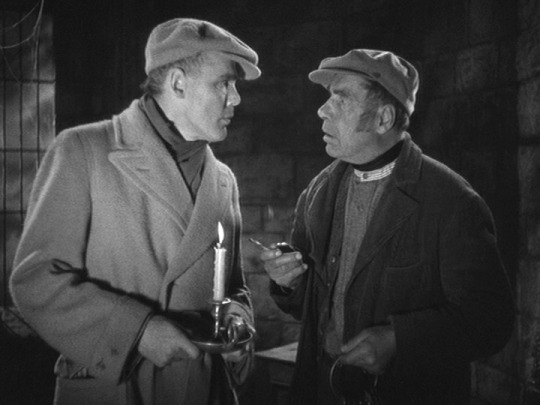
Paul still loves her. Duh. She can’t reciprocate because she’s married.
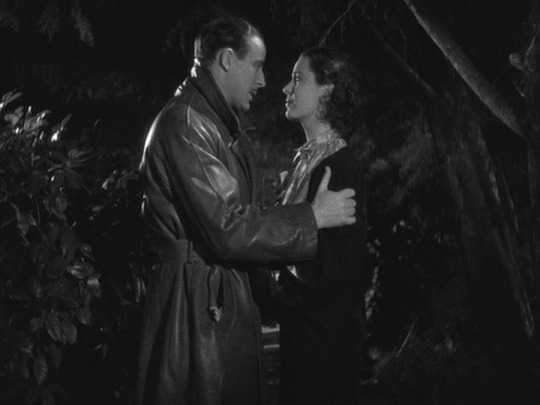
Those bars are toast.
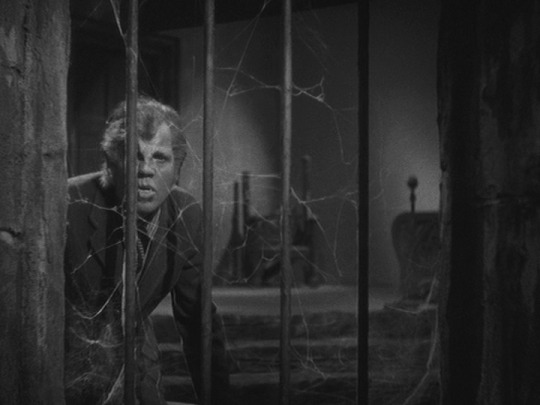
Henry Hull does a great job of prowling with just the right balance between animal and man.

Now that’s a scream:

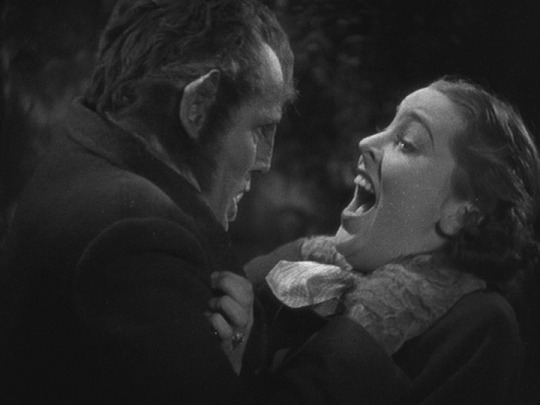
Paul to the rescue.

Paul recognizes Dr. Glendon. (Thanks, Mr. Hull.)
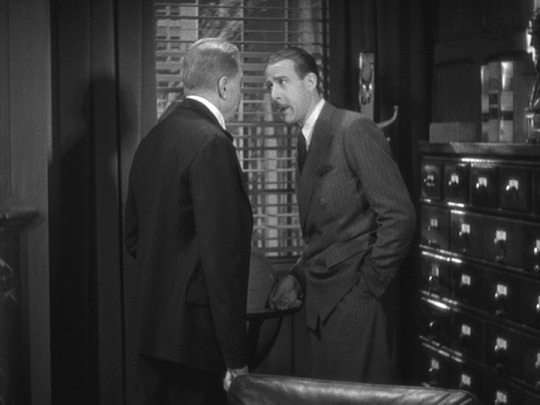
Dr. Yogami’s rooms “smelled like a kennel" when they found the mutilated maid. Yuck. Did he pee all over the room? Not something anyone likes to think about for too long. Especially the head of Scotland Yard. Just look at his face.

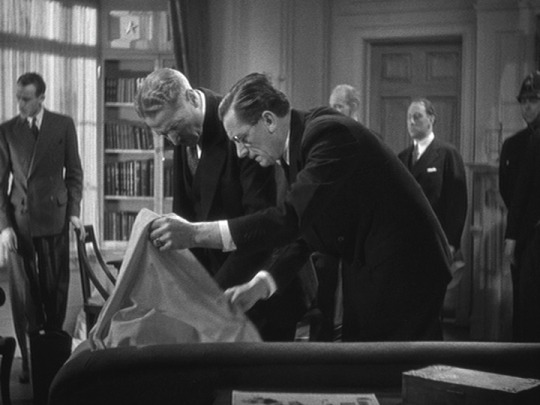
Paul digs through the trash and finds the discarded flowers.
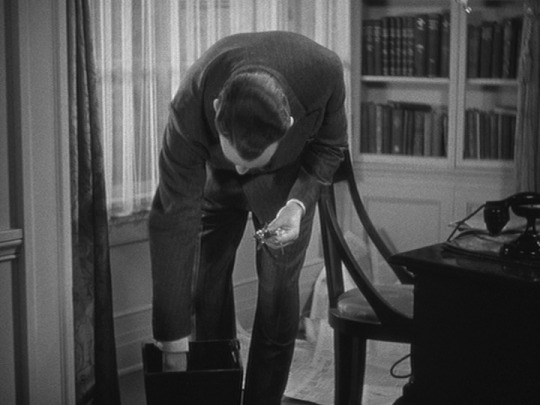
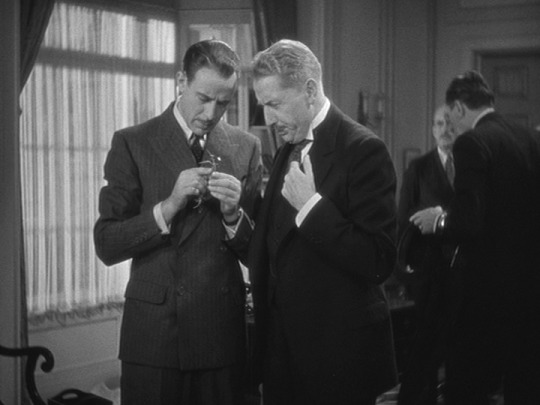
Maybe Paul should work for Scotland Yard instead of his uncle.
Hey how was your trip? So, Hawkins (J.M. Kerrigan) doesn’t think it’s odd that Dr. Glendon is hiding from the police? Does he even know why? Did Glendon tell him “hey I’m a werewolf and I accidentally killed people?” or does Hawkins just give him a pass like “it’s his life and none of my business.”? Well, as the scene suggests, Hawkins clearly does not know because he’s confused by how important this damn flower is to Dr. G.
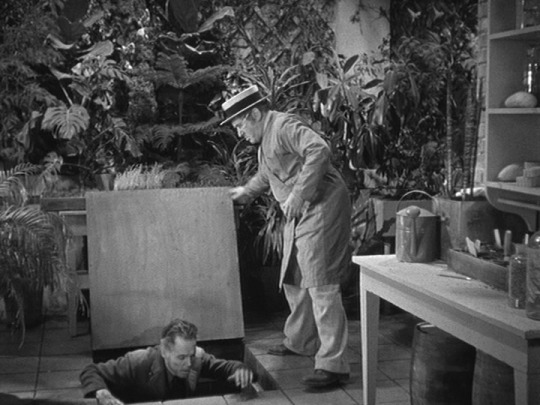
I have to say, I get this excited about my sweet peas every year so I totally identify with his reaction. #humor
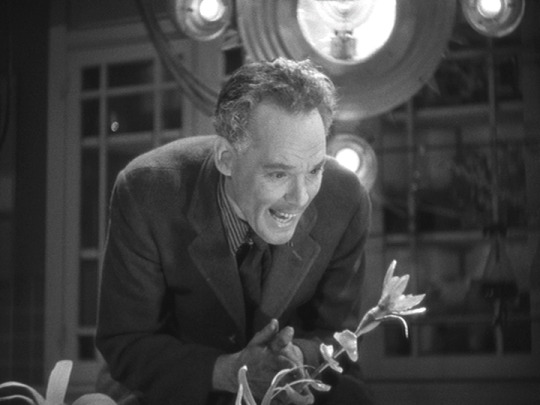
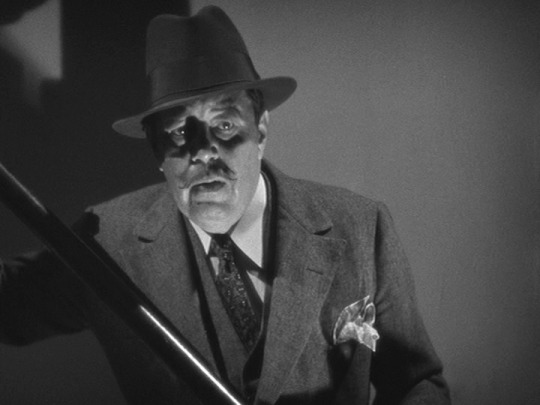
How does he even get into the lab?! Dr. Glendon needs better security or just, ya know, locks.
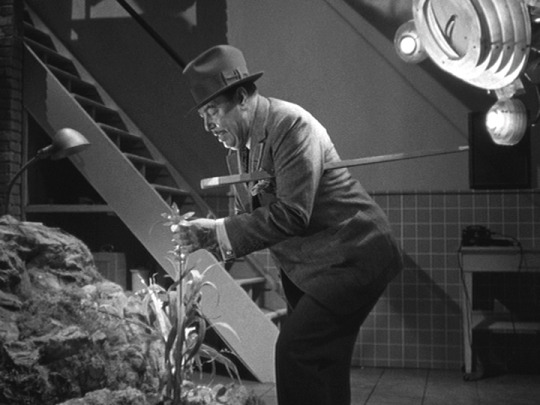
Somehow Glendon doesn’t see Yogami tip-toeing down the steps. How bad does your peripheral vision have to be?!
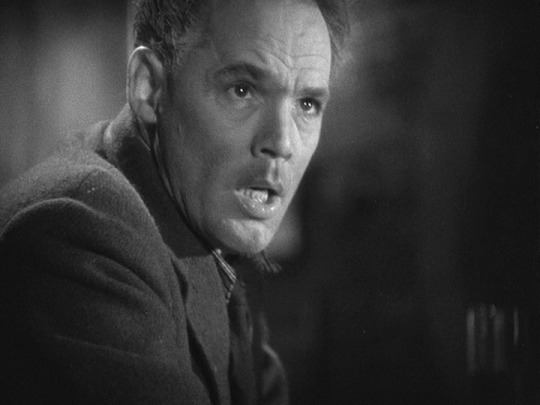
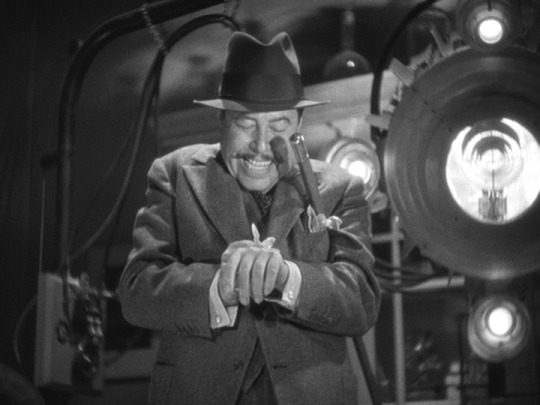
"You brought this on me that night in Tibet!” (You don’t say.)

The problem with stealing a plant that only blooms as the moon emerges is that the werewolf might kill you mid-transformation. Exhibit A:
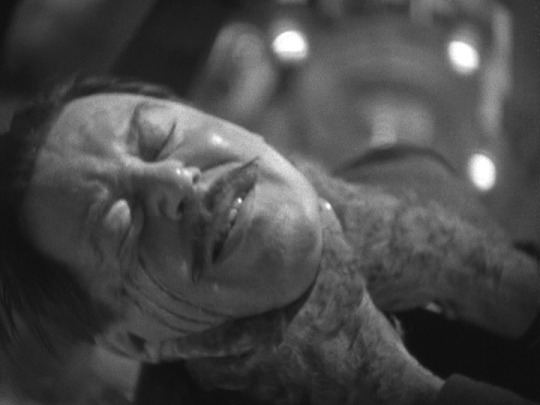
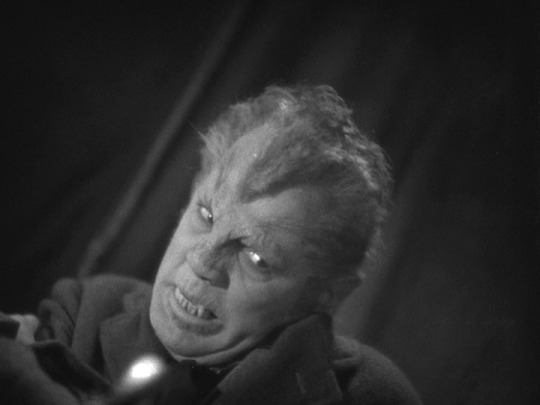

They were both doomed anyway.
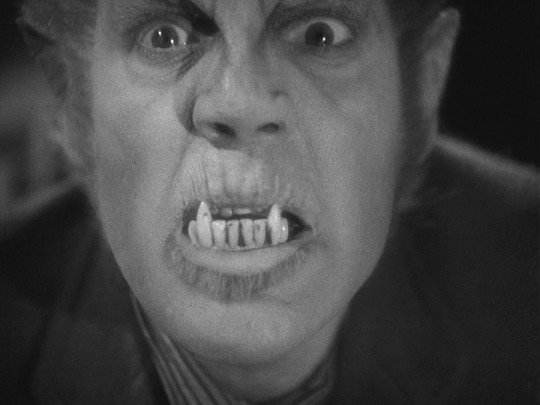
Dr. Glendon goes looking for Lisa.
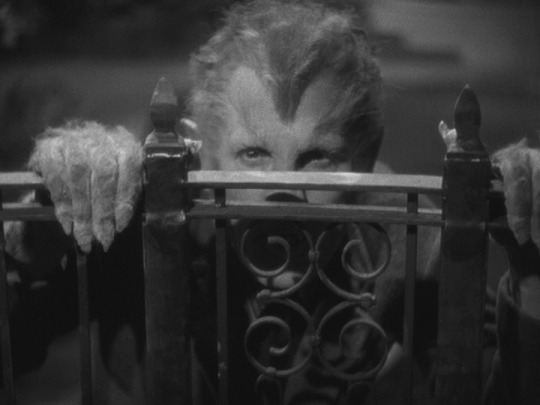

Lycanthropy makes Dr. Glendon strong. Those chintz curtains and flimsy doors are no match for him.
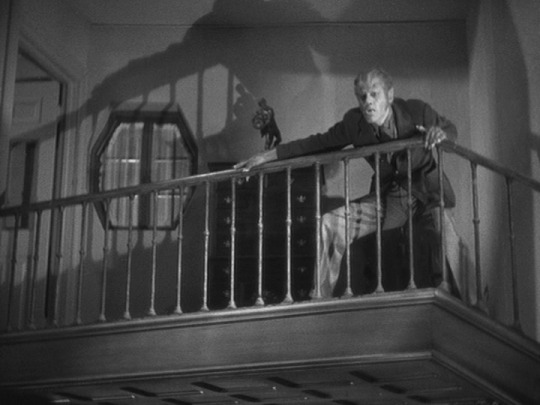

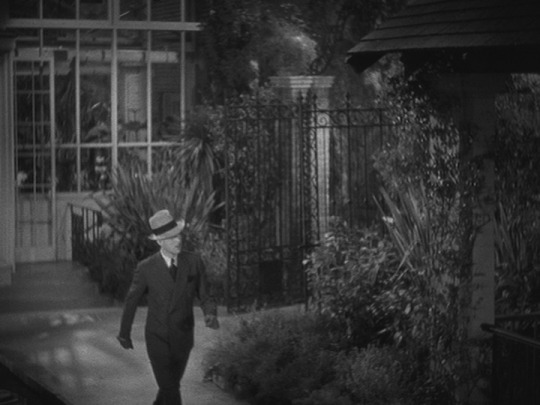
Paul also lacks clear peripheral vision, apparently. Funny how ya don’t see a werewolf perched above a door you’re about to go into.
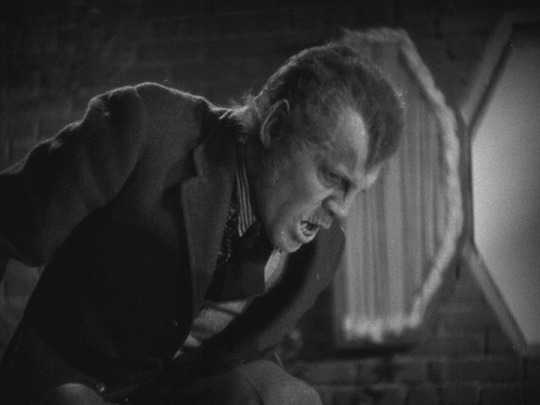
With all that jumping off buildings, werewolves must be prime candidates for knee replacement surgery.
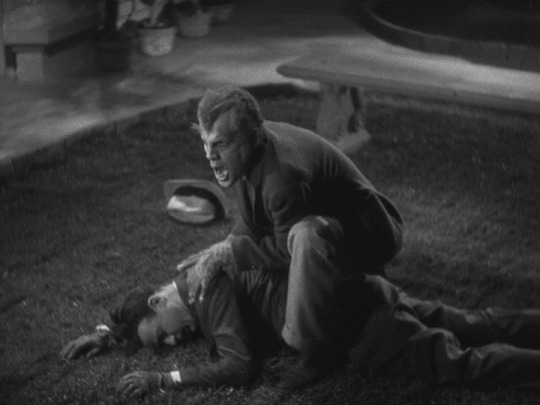
More great uplighting to do justice to some remarkable makeup:

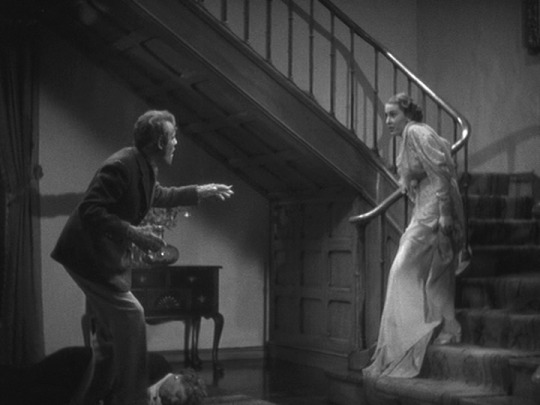
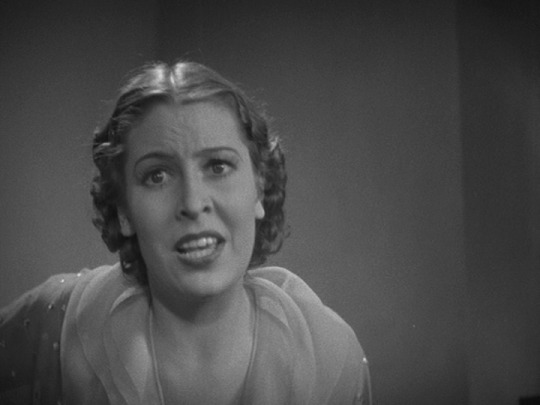
“It’s Lisa!”
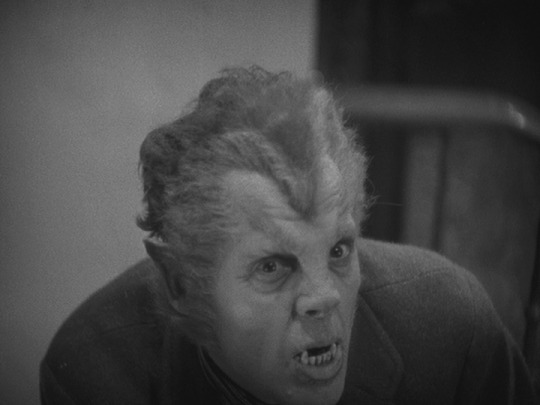
Who the hell is Lisa?
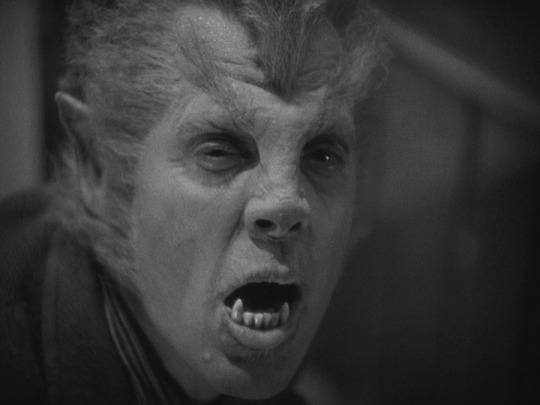
Maybe he remembers at this point. Hard to tell.

A regular bullet does the job. The myth that a werewolf can only be killed by a silver bullet most likely dates back to the legend of the Beast of Gévaudan, in which a humungous wolf is killed by a hunter named "Argent" which is Latin for silver, who uses a gun loaded with silver bullets. The filmmakers clearly don’t feel that this is a necessary part of this movie’s mythology. And in a way, this is a good decision because it makes the werewolf more pitiable and certainly less mythological. If a werewolf has most of the same vulnerabilities as a human, most of the same human rules of existence apply because werewolves are not semi-indestructible. It also just makes werewolves more human and more sympathetic. Werewolf!Glendon is basically afflicted with a kind of disease that could hypothetically be explained by medical science; he isn’t some mythological beast.
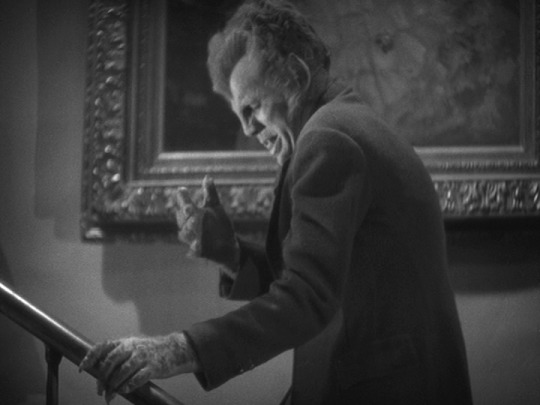
We can presume his soul is saved. “Thanks...thanks for the bullet. It was the only way. In a few moments now, I shall know why all of this had to be.”
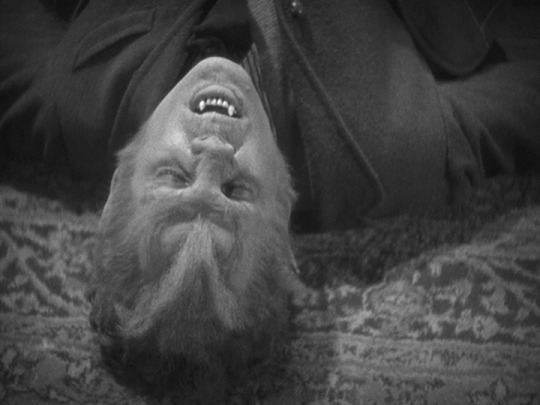
“Good-bye, Lisa. Lisa – good-bye...I’m sorry...I couldn’t have made you...happier...”
(This is immediately followed by the sound of my heart breaking.) Seriously, this isn’t a guilt trip like he thinks Lisa is some overly-needy wife. He knows that he’s not always equip to give Lisa what she needs out of a relationship. He genuinely feels bad. It isn’t because of the lycanthropy, he was like this before, as a scientist. Did he have depression anyway? He might have. He really does love her and they have an understanding. This is probably some of the best acting in the film, the way that Hull delivers his lines and the look on Valerie Hobson’s face tells you so much.
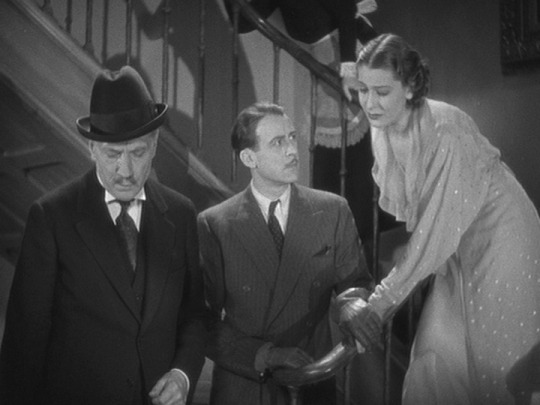
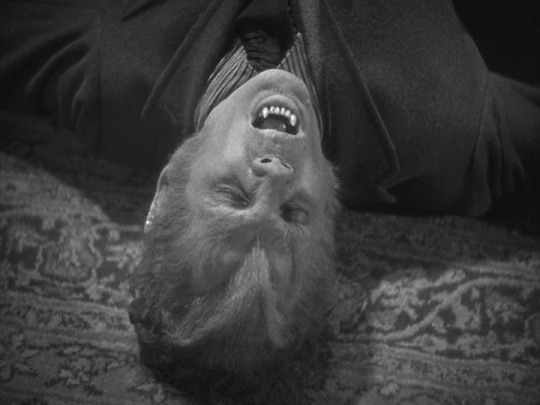

Thankfully, his death means that he is free of lycanthropy.
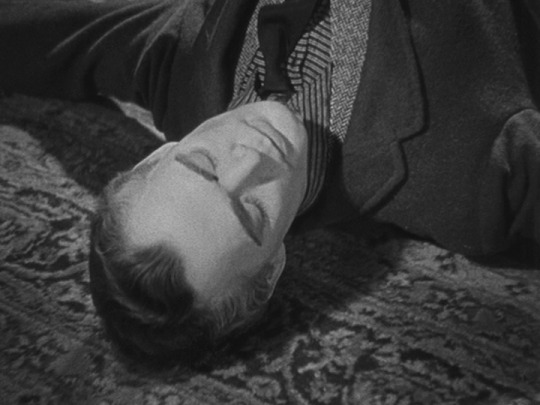
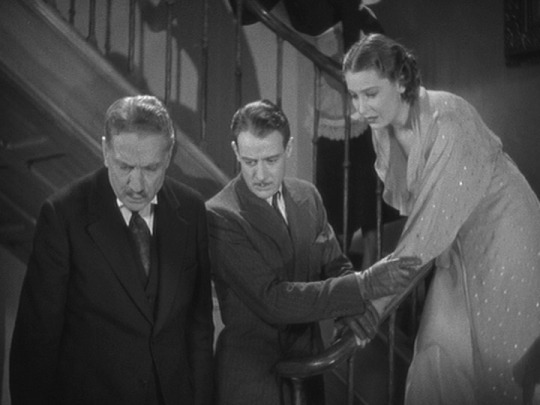
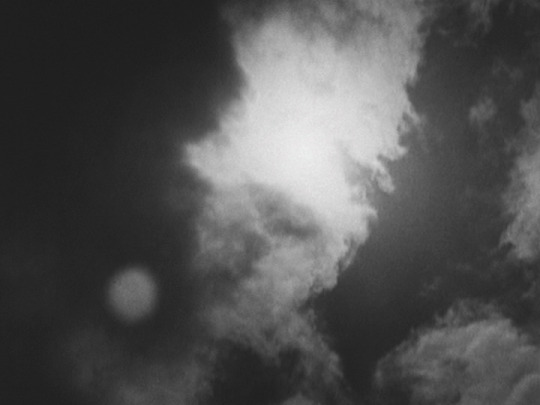
The sun comes up.
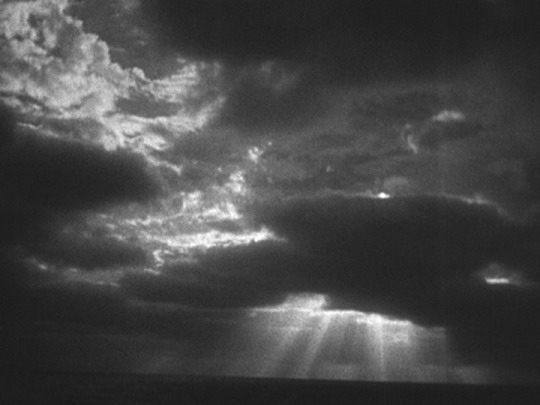
A plane is in the air, presumably Paul and Lisa are off to California.
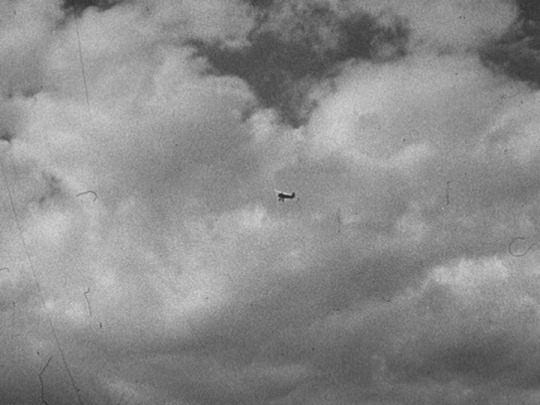
And then we get a nice transition into the Universal Studios plane.
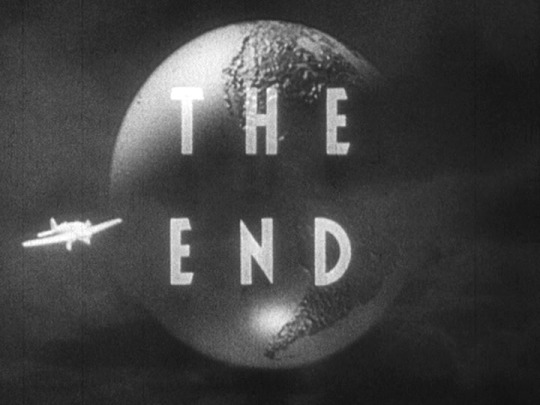
What a trip. Hope you enjoyed my rambling. Until next time.
#Werewolf of London#this took me a month to compile#1935#Henry Hull#Warner Oland#Valerie Hobson#Lester Matthews#old hollywood#whitewashing#classic hollywood#Jack Pierce#werewolves#film reviews#my reviews#long post#movies#films
28 notes
·
View notes
Link
For just $3.99 Blanche Fury Released on February 18, 1948: Blanche marries her cousin Laurence to become part of the Fury's of Clare Hall, but soon is in love with one of the servants who is a descendant of the real owners of Clare Hall. Produced by: Anthony Havelock-Allan Directed by: Marc Allegret Written by: Joseph Shearing with screenplay by Audrey Erskine-Lindop, Cecil McGivern and Hugh Mills The Actors: Valerie Hobson (Blanche Fury), Stewart Granger (Philip Thorn), Michael Gough (Laurence Fury), Walter Fitzgerald (Simon Fury), Susanne Gibbs (Lavinia), Maurice Denham (Major Fraser), Sybille Binder (Louisa), Ernest Jay (Solicitor Calamy), Townsend Whitling (Banks), J.H. Roberts (doctor), Allan Jeayes (Mr. Weatherby), Edward Lexy (Colonel Jenkins), Arthur Wontner (Lord Rudford), Amy Veness (Mrs. Winterbourne), Cherry London (Molly), George Woodbridge (Aimes), Lionel Grose (Jordon), Bryan Herbert (Elliot), Margaret Withers (Mrs. Hawkes), Norman Pierce (coroner), Wilfrid Caithness (clerk of court), James Dale (judge), Cecil Ramage (prosecuting counsel), David Ward (first clerk), Sidney Benson (second clerk), M.E. Clifton James (prison Governor), Michael Brennan (farmer), Charles Saynor (second farmer), Alexander Field (third farmer), Marie Ault (old gypsy woman), Roy Arthur (assessor), Derek Birch (judge's clerk), Vivien Dillon (servant), Lance George (jury foreman), R.W. Haddow (Sir Richard Waterson), Roddy Hughes (master of ceremonies), John Marquand (footman), Hilary Pritchard (court usher) Runtime: (hh:mm) 01:29 *** This item will be supplied on a quality disc and will be sent in a sleeve that is designed for posting CD's DVDs *** This item will be sent by 1st class post for quick delivery. Should you not receive your item within 12 working days of making payment, please contact us as it is unusual for any item to take this long to be delivered. Note: All my products are either my own work, licensed to me directly or supplied to me...
1 note
·
View note
Photo

Ralph Richardson and Laurence Olivier had already developed quite the reputation among actors in the 1930s as powerhouses of the London stage. Both had worked together in the West End and had recently worked together on a production of Othello at the Old Vic, with Richardson in the title role and Olivier as Iago. So the fact that their first film together should be a spy comedy seems counter-intuitive until you see it and ask yourself why it didn’t happen more often? Richardson and Olivier, joined by Valerie Hobson, turn out to be one hell of a good comedy team and Q PLANES (’39) is a comedy so quickly paced and expertly timed, it still seems fresh today.
Read More On StreamLine: Quirks, Quips and Q Planes
#Q Planes#Ralph Richardson#Laurence Olivier#Tim Whelan#FilmStruck#Criterion Collection#StreamLine Blog
26 notes
·
View notes